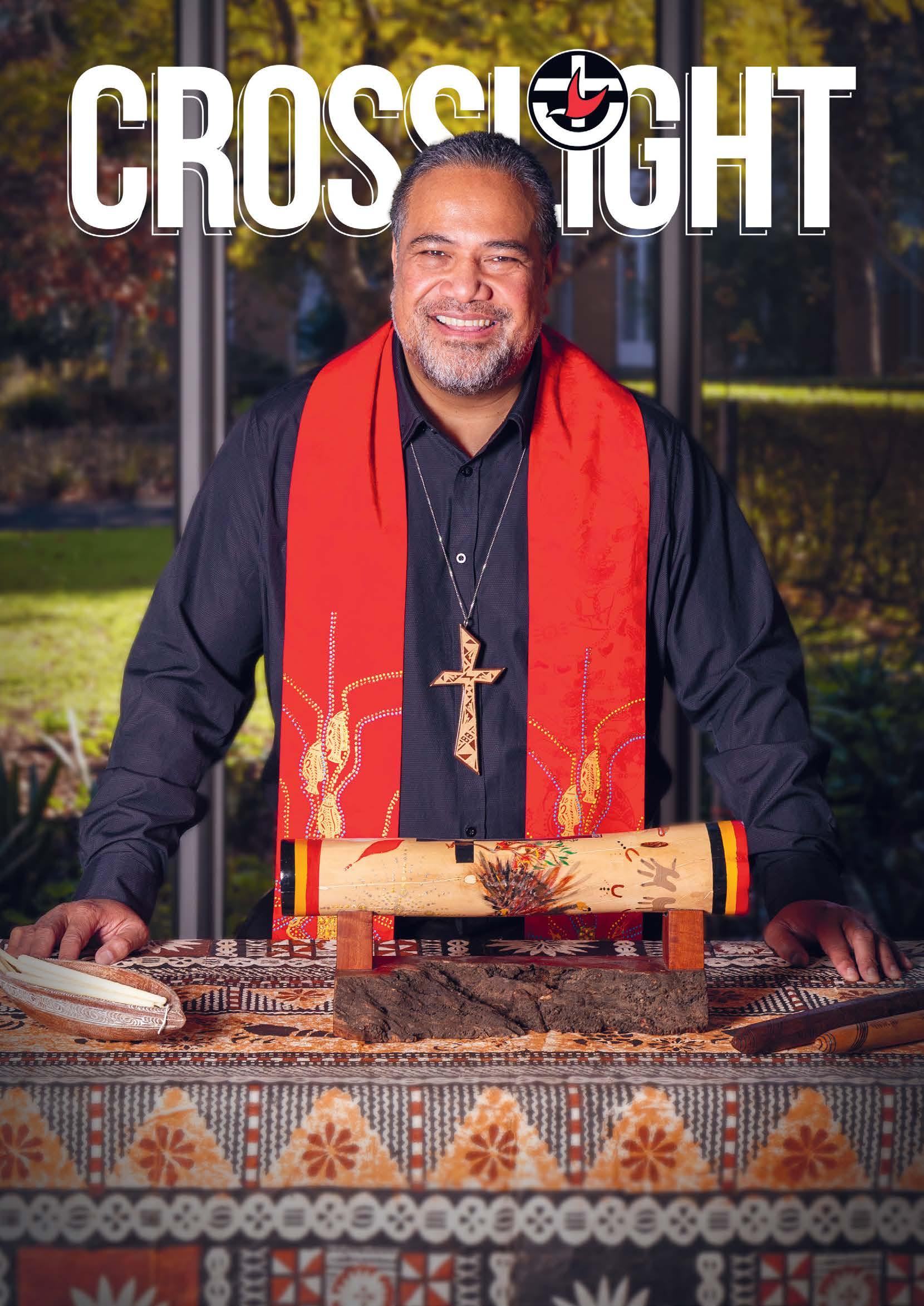

Where there’s a Will, there’s a way
By Andrew Humphries
More than 120 years after it was first awarded, a Uniting Church scholarship continues to give Ormond College medical students the opportunity to make a difference at a global level.
In 1904, money left in her Will by Isabella Manson for the Presbyterian Church provided for an Ormod College student to undertake medical missionary work for the first time, through the John Manson Scholarship.
In November last year, Ormond College students Justine Solomon and Simone Stenner became the latest recipients of the scholarship, now administered through the Uniting Church.
The scholarship, which honours Isabella’s brother John, allowed Justine and Simone to travel to Indonesia late last year as part of a 10-day medical placement in Tobelo, a remote town on the island province of North Maluku, about 3500km from the capital Jakarta.
“Even people from Indonesia don’t necessarily know where Tobelo is,” Justine says.
“You have to fly to Ternate and then get a boat to the island because there are hardly ever any flights there.
“So, yes, it’s very remote.”
The placement also presented one or two language difficulties for the pair.
“Simone and I don’t speak Indonesian so we had to consider how we could best communicate with people, particularly in a medical context,” Justine says.
“We relied on a lot of non-verbal communication, such as body language and gestures, to ensure mutual understanding and provide the most effective assistance possible.”
For final-year medical student Justine, who hopes to practise as a paediatrician, it was an opportunity to explore how medicine works in a remote area with limited resources.
“Unlike in Australia, where
hospitals are well-equipped with modern technology and a wide range of medications, rural Indonesian hospitals operate with ingenuity and resourcefulness,” she says.
“It meant the medical staff were very good at making decisions based more on signs and symptoms, rather than using the sort of diagnostic tools that we take for granted in Australia.
“In Australia, advanced imaging such as CT scans and MRIs are readily available to diagnose conditions like strokes or traumatic injuries.
“However, in rural Indonesia, these resources were either scarce or nonexistent, requiring doctors to rely heavily on clinical signs and symptoms for diagnosis and treatment.
“Some of the surgeries being performed were quite complicated, and it was amazing to see how they were able to do so much with essentially so little.
“Despite the absence of some modern equipment, the dedication and skill of the surgical teams ensured that patients received the best possible care.
“The operating theatre experience, and being able to assist in some surgery, was probably the best part of the placement.”
The placement also offered Justine and Simone a hugely rewarding experience on so many levels.
“We were able to explore the different food and wonderful natural beauty of the area,” Justine says.
“From breathtaking beaches to lush forests, the beauty of Indonesia was awe-inspiring.
“The opportunity to travel to nearby islands further enriched our experience, offering a glimpse into the diverse landscapes and cultures that make up the region.
“Everyone was so welcoming, and the kindness and hospitality of the local
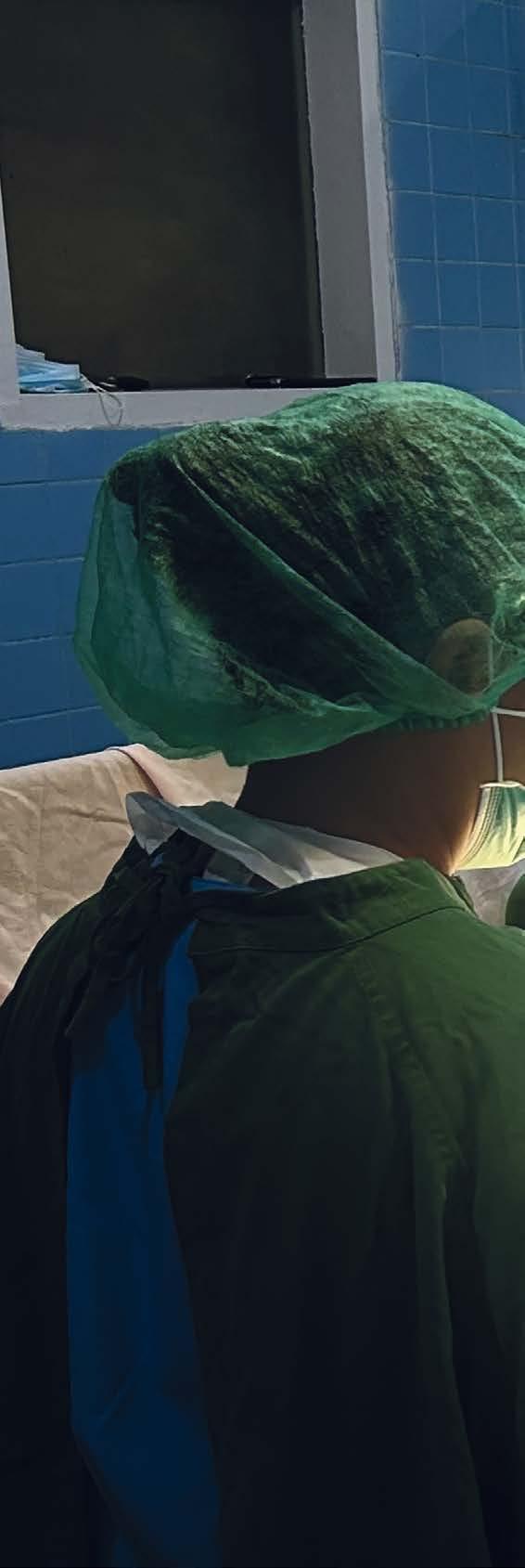
people made our stay unforgettable.
“Families opened their homes to us, eager to share their traditions and way of life, and their generosity and warmth made us feel not just like visitors, but like part of the community.”
Justine says she and Simone will take a great deal of what they learnt during their placement into their future medical careers.
“It was a profound learning experience,” Justine says.
during her medical placement.
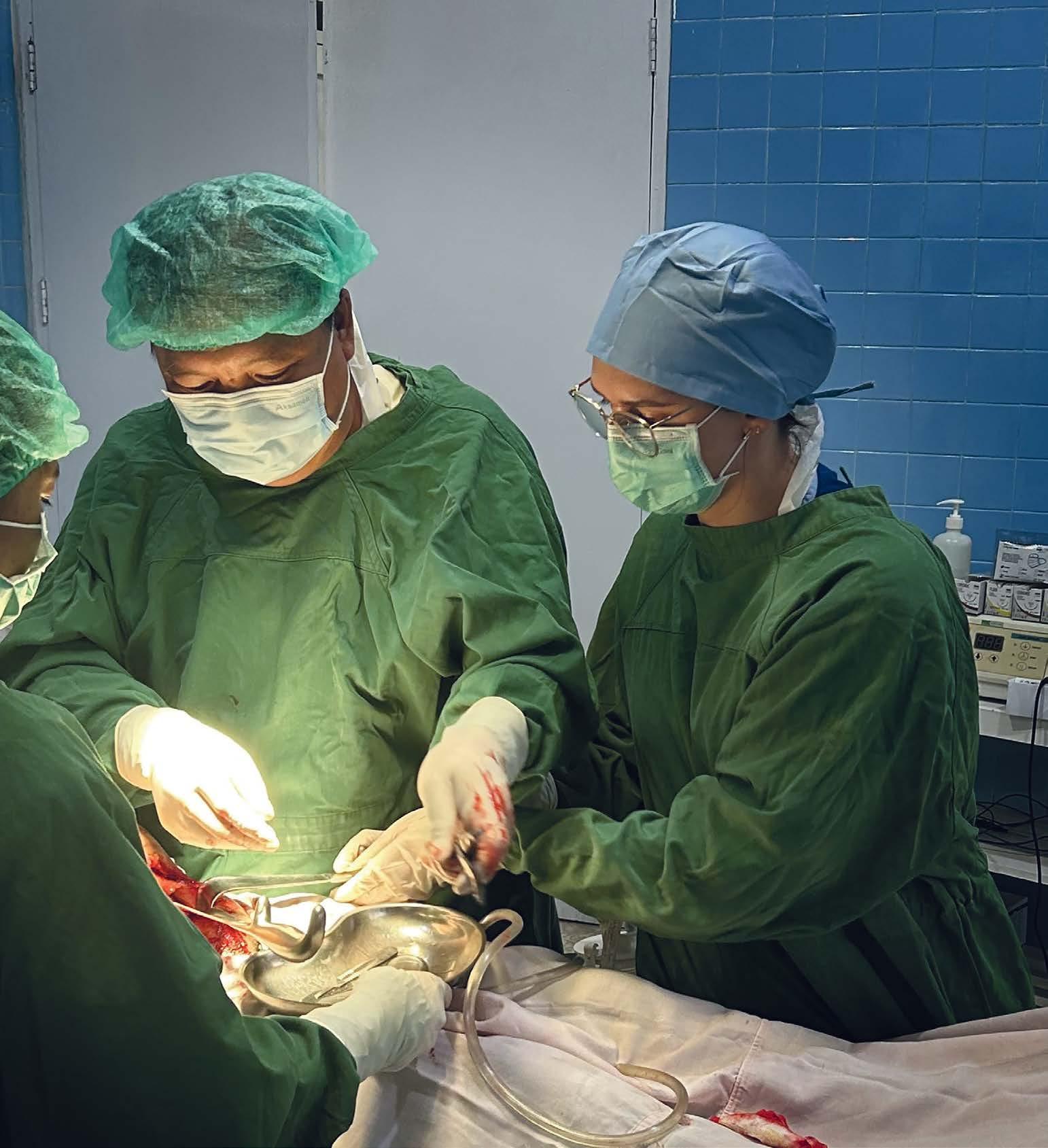
“The resourcefulness of the healthcare system and the resilience of patients and staff highlighted the challenges of practising medicine in a low-resource setting.
“Beyond medicine, we were deeply moved by the warmth and generosity of the local community, and this experience reinforced the importance of adaptability, cultural understanding, and human connection in our future medical careers.”

Simone Stenner, right, assists with surgery
Below: Ormond College students Simone Stenner, left, and Justine Solomon.
Faithful get ready to gather
While all Synod Meetings are important, General Secretary Rev Dr Mark Lawrence says there is something particularly special about any that include the installation of a new Moderator for the Church in Victoria and Tasmania.
Such an occasion will take place at Kingswood College in Box Hill on August 30, when Rev Salesi Faupula is installed as Moderator, accepting the ‘baton’ from Rev David Fotheringham.
The Opening Worship featuring Salesi’s installation ushers in Synod 2025, which will continue until September 2 at Box Hill Town Hall.
“This Synod Meeting provides a wonderful opportunity to welcome our new Moderator, and to also give thanks and express our deep appreciation for David’s three years as Moderator,” Mark (pictured) says.
As David steps down, Mark says he can be proud of the huge contribution he has made to the Uniting Church in Victoria and Tasmania, and the crucial role he has played in shepherding the Faithful Futures Project.
“David has juggled some public, and internal Church matters that most of the Church won’t hear about, extremely well during his time as Moderator,” Mark says.
By Andrew Humphries
“He has become the ‘face’ of Faithful Futures and has worked tirelessly to engage across the presbyteries, with the Standing Committee and other Synod committees, to get us to this point at the Synod meeting where hopefully we can endorse Faithful Futures’ common directions.
“David’s leadership, understanding of strategy, and pastoral insight have all come together wonderfully well for all of this.
“He has been the right Moderator at the right time to support the whole Church in working through this process.”
Mark says there is a level of excitement building as Salesi prepares to step into the Moderator’s role.
“Every Moderator brings a particular set of gifts, and Salesi is a deeply respected minister who brings an incredibly diverse cultural background into the role,” he says.
Mark says Synod members are preparing to meet from August 30-September 2 as the Church addresses a constantly changing landscape.
“The reality is that the Uniting Church, like all churches, is going through a significant time of change, both internally and externally,” he says.
“The attitudes of the wider community to religion and spirituality are changing, and the Synod and Standing Committee are addressing that reality very responsibly.
“It’s why we have supported and encouraged the Faithful Futures Project, because our missional sustainability centres around all of us across the Church working together, collaboratively and enthusiastically, and encouraging one another in our particular responsibilities.
“The Synod Meeting will engage with Faithful Futures in the hope of having shared strategic directions between all of the presbyteries and the Synod, so oversight responsibilities can be exercised with common goals.”
Mark encourages Synod members to embrace the opportunity to gather over the four days to contribute to shaping the Church in Victoria and Tasmania.
“Above all, this is a gathering of faithful people, offering an opportunity for the encouragement, inspiration and education that all happen within the life of the Synod meeting,” he says.
“It’s about getting involved, participating in working groups, joining in plenary discussions, going to the various activities, as well as praying and worshiping together and sharing in Bible study and theological reflection, which are part of the meeting.”
Synod 2025 includes worship, Bible studies, theological reflections, an elective program on the Sunday morning focused on the proposed Faithful Futures goals,

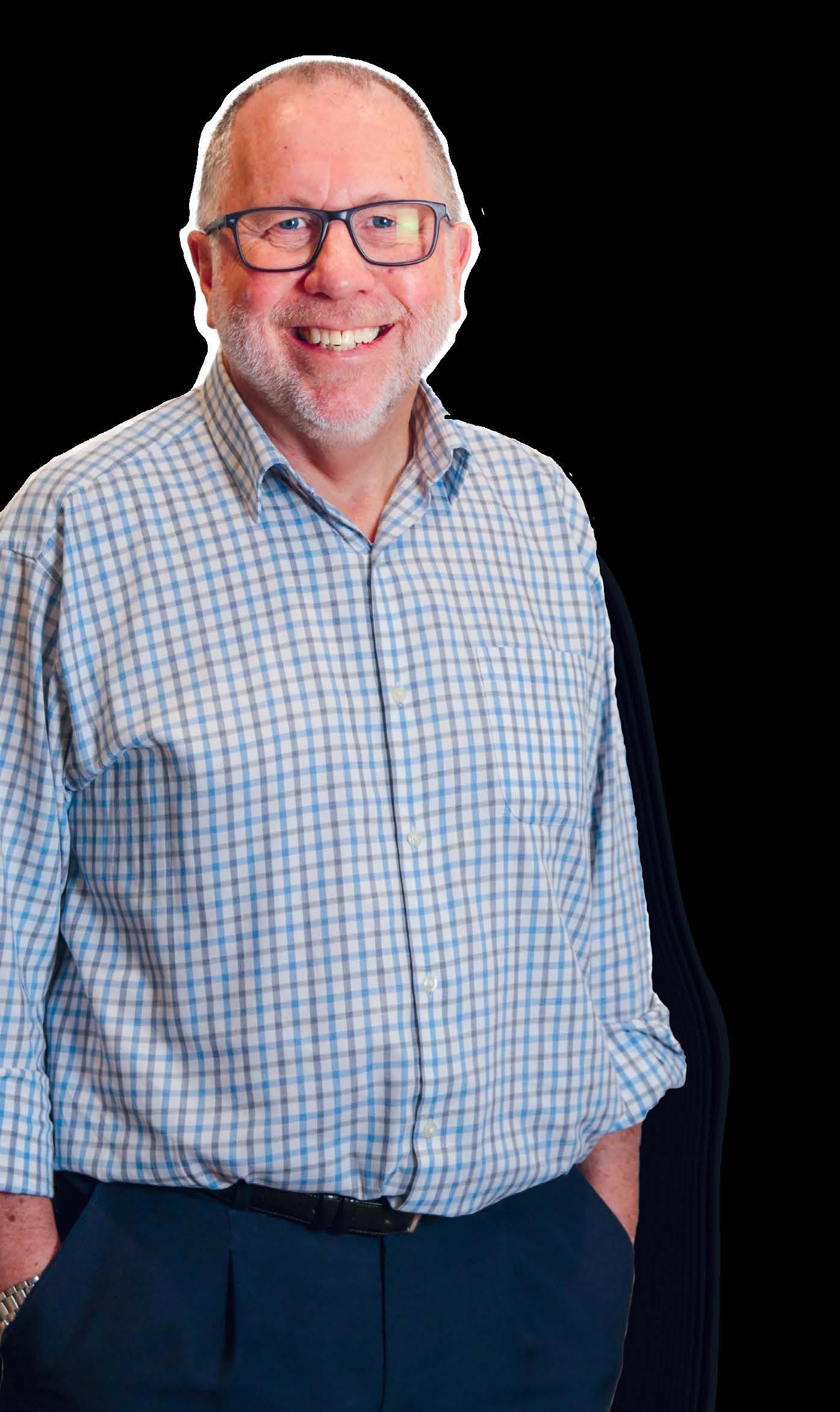

and Deep Dive sessions - presenting an opportunity for members to engage deeply with various reports.
“We reflect on the life of the Church at the moment, how we can be resourced to undertake our personal and communal ministry and mission, and what the future might look like,” Mark
“Ahead of time, it’s really important that Synod Meeting members read all of the reports, which will be provided online, so they know what is being explored and are prepared and ready to
“Many reports have video introductions, which will also be available online prior to the meeting.”
While there is a serious side to the business of a Synod Meeting, no less important is the opportunity for members to gather together in a sense of community and development of
“The social aspect of a Synod Meeting is really important and it’s a joy for me to see that embraced, as it is for many members who may only see each other at Synod Meetings,”
“A temporary Christian community is formed at a Synod Meeting, and new friendships and new ways of sharing happen as we explore matters of life and faith.”
Synod 2025 will be livestreamed, while Opening Worship and installation of Salesi as Moderator at Kingswood College is open to the public.
In his father’s footsteps
Rev Salesi Faupula will be installed as Moderator of Victoria and Tasmania on August 30, and his late father Haloti will be with him in spirit every step of the way.
When Rev Salesi Faupula is installed as Moderator of the Synod of Victoria and Tasmania later this month, it will be 25 years since the death of his father Haloti.
Yet Haloti continues to have a profound influence on Salesi’s faith journey.
In a real sense, Salesi is the son who followed in his father’s footsteps.
Haloti came to the Northern Territory in 1972 as a missionary with the Free Wesleyan Church of Tonga, before becoming a minister in 1979 with the still relatively new Uniting Church in Australia.
He was, says Salesi, a humble man of deep faith and conviction, traits Salesi will carry into the role of Moderator.
Salesi will honour his father at his installation on August 30 by wearing the blue alb that once belonged to Haloti.
And while his father won’t be there to see his son become Moderator, that alb will be an important companion for Salesi during the ceremony, and a reminder that Haloti still walks with him in spirit.
It’s the same alb Salesi wore when he was ordained in 2012.
“Dad was a little bit shorter than me and a little bit smaller”, Salesi says with a laugh, “but it fit me perfectly when I was ordained, and I felt such a strong connection to him then.
By Andrew Humphries
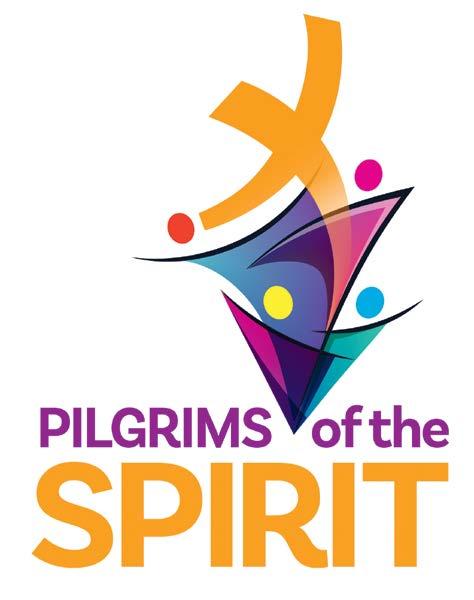
“I feel incredibly proud to be able to wear it at my installation as Moderator.”
Salesi says there will be a touch of sadness around his father’s absence on such an important day.
He would, he admits, give just about anything for an opportunity to tell Haloti how much he inspired him.
“My father never forced or imposed anything religious on me, and my relationship with him was very strong,” Salesi says.
“Towards the end of his life, I was still part of the Church, and I think part of that was wanting to be like him.
“But my father died in 2000 before I
went down the path of ordination, so he never got to see me ordained.
“His death was a significant moment for me, because the relationship I had with him had defined a sense of place for me, and so I was devastated when he died.
“The relationship I had with him was one that I finally found with God, and it’s one that has deepened over time.
“My mother would often say to me when I was a minister that ‘I’m sure you wish your dad was alive so you could share some of the joy and many questions you might have’.”
Salesi confesses to some uncertainty about what lies ahead, but is focused on what strengths he will bring to the Church as Moderator.
“There is a level of excitement around it all, but there is some nervousness there as well,” he says.
“There is definitely a sense of expectation, both from the Church itself and I, but being nominated, and then elected Moderator, had me thinking about the different gifts that I have and how they translate into such a role.
“The connections and relationships I have formed in congregational ministry, at a presbytery level, and within the Synod itself, have been very important to me and will continue to be as Moderator.
“I have had the privilege of being able
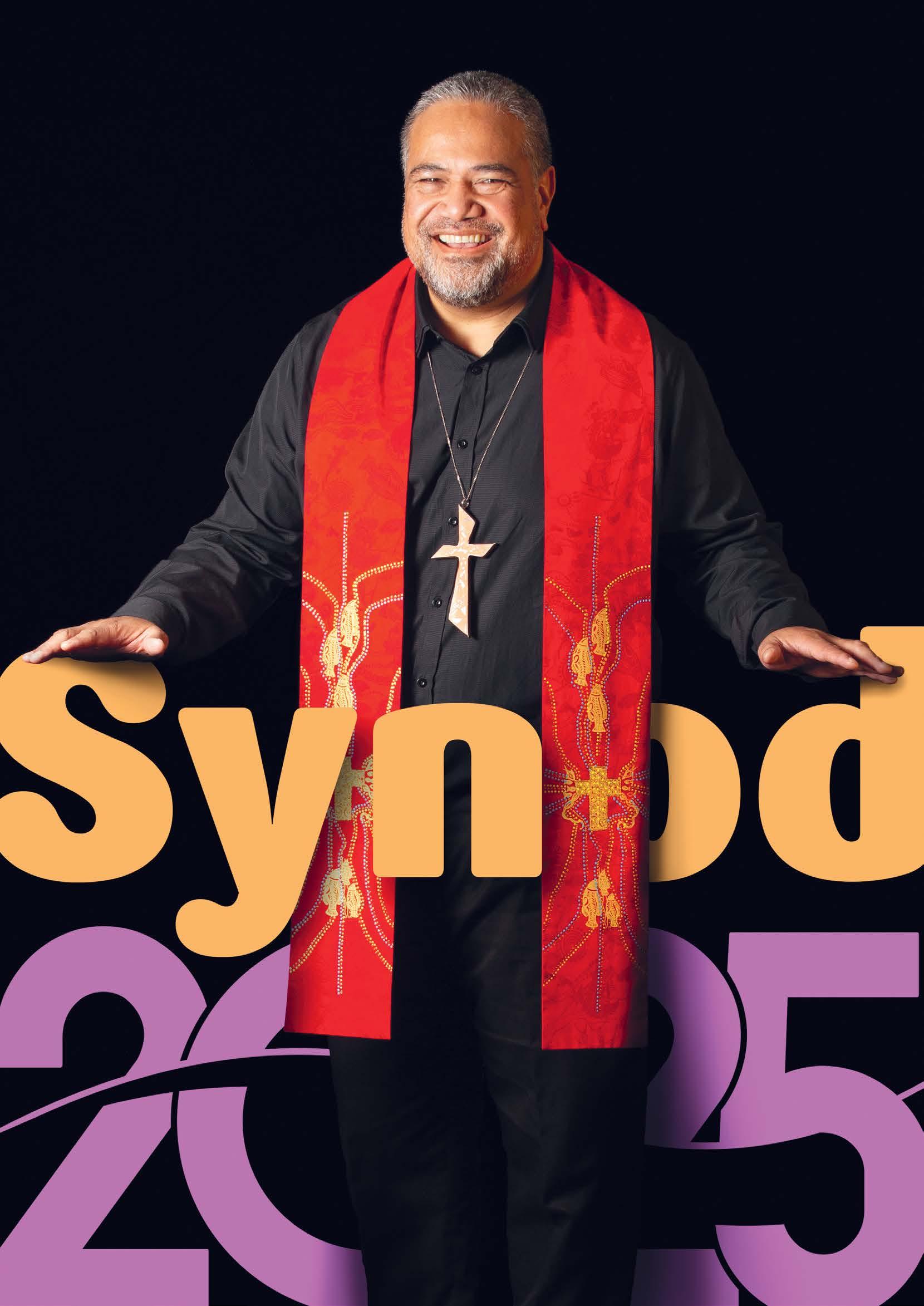
Rev Salesi Faupula will be installed as Moderator of the Uniting Church in Victoria and Tasmania on August 30.
Image: Carl Rainer
to participate on both presbytery and Synod-level committees, and have seen both the blessing and struggles that exist within all of that.
“There is a blessing involved in being able to work together, but within that are the struggles involved in making difficult decisions that can take some time.
“I was brought up in a household that focused on the responsibilities rather than the privileges in life, as a way of sending the message that sometimes this world has its ups and downs, but it’s about carrying out duty and being aware of responsibilities.
“When I began my first placement some years ago I can remember walking past this beautiful office, which I knew would soon be my office, and thinking to myself that there was a level of responsibility expected from me that should match that beautiful office.
“It’s with a deep sense of that responsibility that I take on this important role as leader.”
As Moderator, the three themes of diversity, inclusivity and unity will drive much of Salesi’s work.
“These three streams, although individual, combine and for me provide the essence of some core ingredients to being faithful to the realm of the kingdom,” he says.
“As Christians we wrestle with diversity, and inclusivity, and around how we can unite together, yet we also put parameters around them and say that it’s in this ‘form’, but I don’t think that completely describes who God is.
“A character in the movie ‘Conclave’ utters the line that ‘the enemy of faith is certainty’, and that is something I reflect on.
“We are human beings and if we are looking for the perfect we won’t find it because there are always these levels of uncertainty.
“A part of wrestling with diversity, inclusivity and unity is that we have
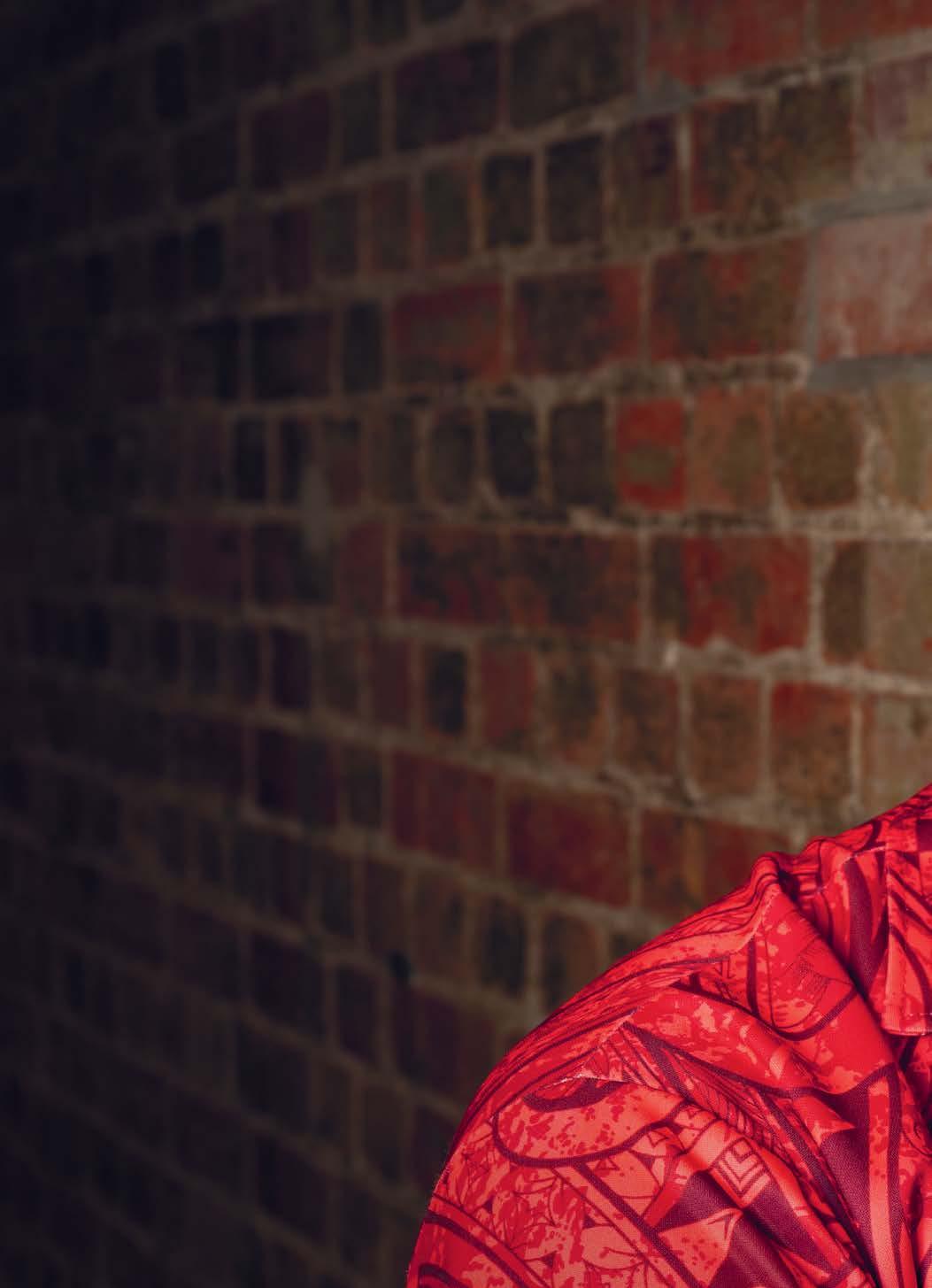
"I believe that God calls me into this role and continues to equip me for it, and that is where my faith lies," says Rev Salesi Faupula.
Image: Carl Rainer
boxed God in, and put parameters around God, so that when we are inclusive it’s in a particular way, but the radical nature of God is different, and we see that in Jesus.
“So we lean in on God for understanding and there are some unclear and uncertain elements around the journey ahead when we do that.”
But the journey ahead, Salesi says, is what makes it all worthwhile.
“The element of faith in inclusivity, diversity and unity that holds everything together under this banner is grace,” he says.
“I want to be as faithful as I can and there will be parts of this journey that I continue learning from.
“There will be a certain level of me adapting, learning and growing, but also showing an ability to listen intently, so there is a genuine and authentic connection from me.
“I have been shaped largely by the Uniting Church and I love the way in which the Church attempts to wrestle with those aspects of inclusivity, diversity and unity, and the ways in which we try to hold them together.”
There are though, he says, challenges facing the Uniting Church, at both Synod and national level that require careful examination.
“At the moment we measure the health of a congregation based on its finances, but is that the reality when we consider the vitality of a congregation?” Salesi asks.
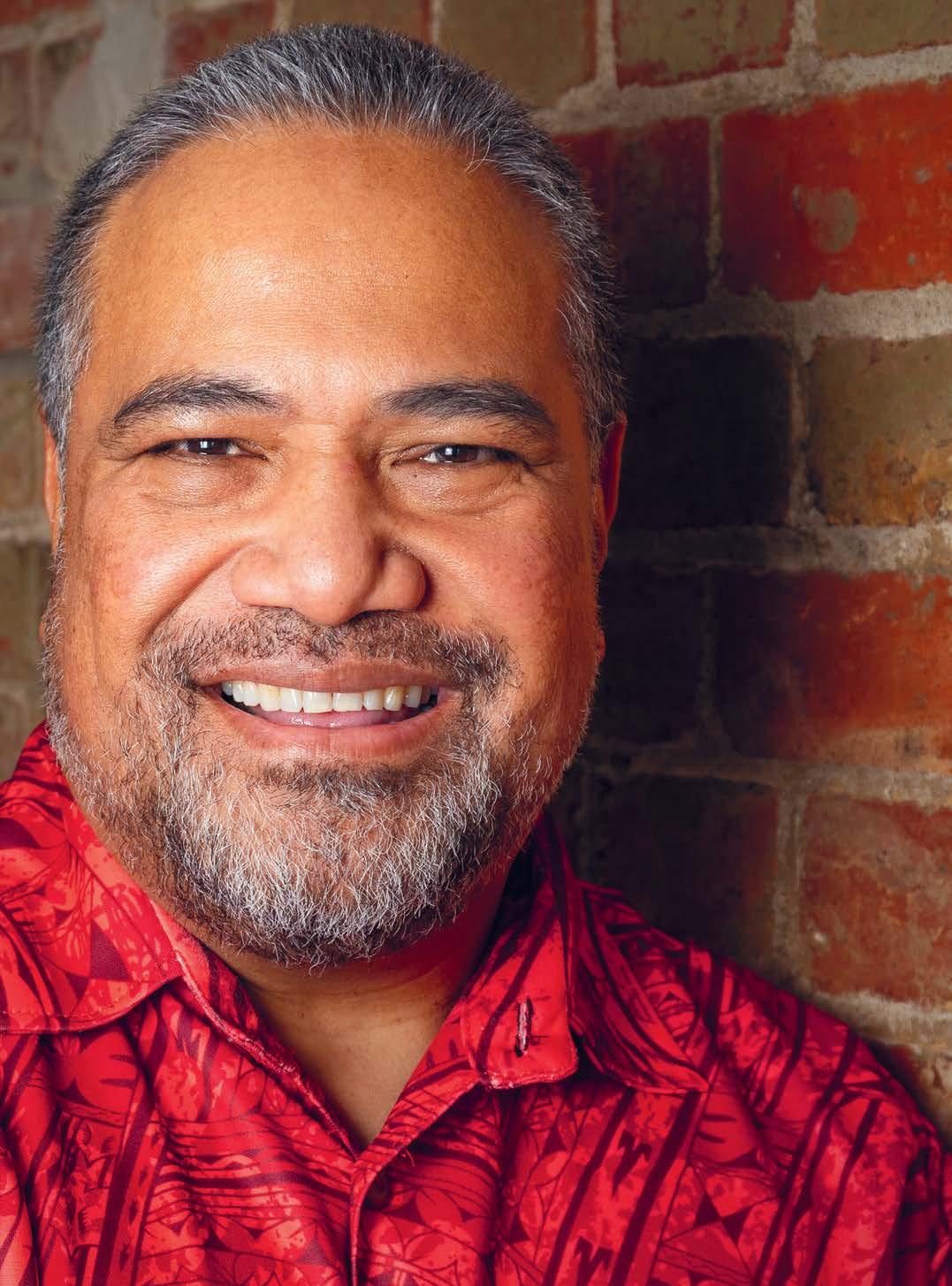
“We have some congregations that may only have 15 members but have a financial portfolio in the millions, and some congregations that have an overflow of members but struggle financially.
“There is far more to a congregation than just its finances, and if we draw conclusions based on letting finances be the guide we will have a lot of money and property, but hardly any people.
“I don’t think Jesus ever said, ‘wait until that place is financially stable and then go out and minister to it’.
“It also means that as a Church we should sometimes be on the margins, wrestling with some of the more controversial issues.”
With a deep sense of humility Salesi is preparing for August 30 and the beginning of his three-year term as Moderator.
He will, he says, be his own man, and one passionate about fulfilling this particular calling from God.
“I can only be who I can be, and if I try and be (previous Moderator) David Fotheringham, or someone else, I’m going to fail,” he says.
“But I can be Salesi and, however that plays out, I believe that God calls me into this role and continues to equip me for it, and that is where my faith lies.
“I don’t think the role of Moderator in Victoria and Tasmania is so much about being an individual as wanting to be a cog in the journey of the Synod and the Uniting Church, and when we look at the Uniting Church and where it’s placed in terms of its faithfulness to the gospel, I think we are doing well.”
Pride in a multicultural Church
As he prepares to take up the role of Moderator, Rev Salesi Faupula is proud of the fact he will become another senior Uniting Church in Australia leader of Pacific Island background.
Salesi joins President Rev Charissa Suli and NSW/ACT Moderator Rev Mata Havea Hiliau as leaders of Tongan heritage within the Uniting Church.
All three also share a special bond through their shared history with the Uniting Church on Sydney’s northern beaches.
“As we celebrate 40 years of being a multicultural Church, I can’t help but be aware of the fact that our President, NSW/ACT Moderator and I are Pacific Islanders,” Salesi says.
“All three of us were part of Dee Why Uniting Church in Sydney, and grew up together, so we have very close connections.
“Charissa tells us that we see further because we have stood on the shoulders of the giants of faith, and each of us are a part of some of the streams in which God is working in the Pacific Islands.
“To have the three of us in significant roles within the Church makes me think Charissa is right, and it is thanks to those shoulders of giants we have been able to stand on.”
Salesi says his own background is proof of the benefits multiculturalism can bring to the Uniting Church.
He is, he admits, a “colourful mess” when asked how he would describe himself: Tongan-born, Australianraised and with a deep connection to indigenous Australians.
“I’m not just an advocate for multiculturalism, I’m a living witness,” Salesi says.
“I was born in Tonga, grew up in an indigenous community in the Northern Territory and was raised on Sydney’s northern beaches.
“So if someone asks me about my background I say I’m Tongan, Australian and Aboriginal, and all of them fully together.”
All set for Synod 2025
Synod meetings, which occur about every 18 months, are opportunities for members to discern the big-picture matters which make us the Uniting Church.
Chaired by Moderator Rev Salesi Faupula, Synod 2025 offers an opportunity to share stories, build community, gain new perspectives, and discover new ways of supporting one another in faithful witness.
Synod 2025 will begin on Saturday, August 30 and will conclude on Tuesday, September 2.
It will commence with an Opening Worship service from 10am at Kingswood College in Box Hill, which this year will include the installation of new Moderator Salesi.
The Synod Meeting itself will commence at 1.30pm at Box Hill Town Hall and conclude by 4pm on Tuesday, September 2.
For younger members attending, Synod’s Younger Generations team will be holding an in-person orientation session on August 29, the day before Synod commences.
This will be an opportunity for younger members to get to know each other, meet the new Moderator, and to familiarise themselves with Box Hill Town Hall, with a few fun surprises thrown in.
Members at Synod 2025 will also have the opportunity to attend elective sessions, an educative opportunity providing knowledge and learnings to resource members for their role(s) within congregations, presbyteries and wider Church engagement.
Members will also be able to connect more deeply with the Synod reports by attending two deep dive reporting sessions which provide space to engage, explore and ask questions of reporting body achievements, future challenges and opportunities, in a creative and interactive environment.
Synod 2025, including Opening Worship, will also be livestreamed.
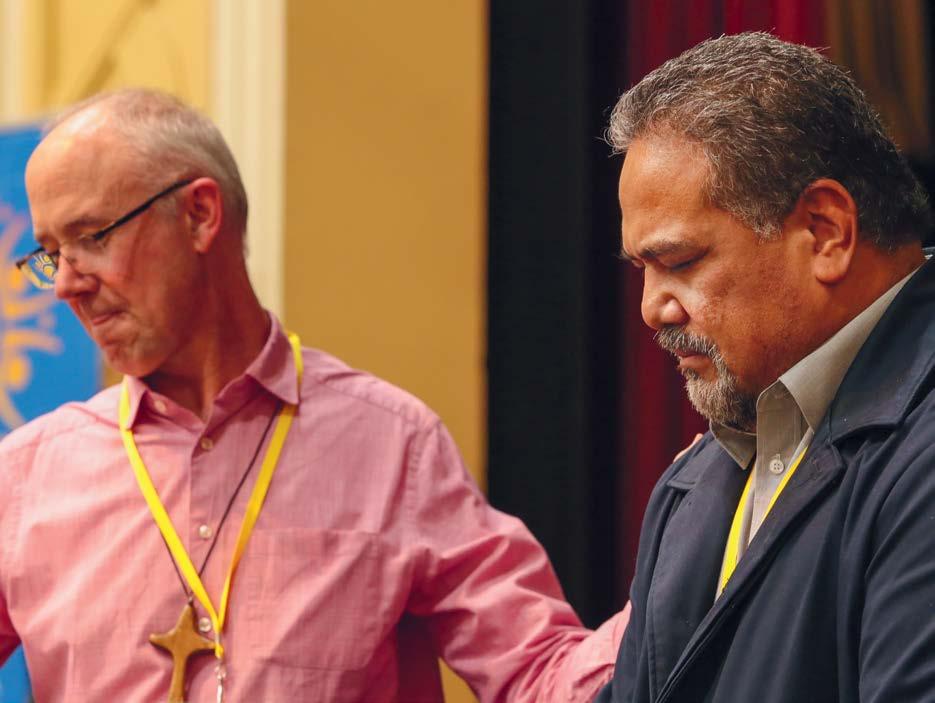
Typical agenda items at a Synod meeting
Reports from governance committees, the Victorian and Tasmanian Uniting Aboriginal and Islander Congresses, Uniting Church in Victoria and Tasmania institutions such as Uniting AgeWell, Uniting Vic. Tas and U-Ethical, task groups, senior leadership (including the Moderator and General Secretary Rev Dr Mark Lawrence), and from the Assembly President Rev Charissa Suli.
Elections to be held during Synod 2025 may include Synod Standing Committee, Chairperson of Placements Committee, and Synod Property Trusts (Victoria and Tasmania) members.
Proposals from committees, Synod institutions, presbyteries and some working units are put to the meeting seeking guidance on the future of their work. Previous examples
include the Synod’s response to issues like Voluntary Assisted Dying legislation, establishing the Money for Mission Fund, and social justice priorities.
Worship forms an important part of Synod meetings and includes opening and closing worship services. Each day usually commences with Bible studies and concludes with a theological reflection on the day’s business.
Synod 2025 will also include a Tributes Service which honours ministers who, since the previous Synod meeting in 2023, have been ordained, retired or been received from other denominations, have celebrated milestones such as 50, 60, 65 and 70 years since ordination or commissioning, as well as those who have passed away.
Moderator Rev David Fotheringham and Rev Salesi Faupula during the announcement in 2023 of Salesi as Moderator-elect.
Readings and reflections
One of the highlights of Synod 2025 will be the daily Bible studies and theological reflections, to be provided by Pilgrim Theological College’s Rev Prof John Flett, and Methodist Church of New Zealand General Secretary Rev Tara Tautari, respectively. John and Tara describe what they hope to bring to Synod 2025.
As a daughter of the Methodist Church in Aotearoa and grandchild of Te Ao Māori (Māori world), my daily theological reflections for Synod 2025 will be shaped by the whenua (land), by our ancestral narratives, and by scripture read through the lens of covenant and collective restoration.
These storylines of faith and longing will draw from te taiao (the natural world), pūrākau (ancestral wisdom), and the deep currents of our bicultural journey as Church.
Each reflection will seek to rekindle the vā, the sacred relational space, between people, with Papatūānuku (earth parent), and with God.
Grounded in Māori and Methodist tradition, these reflections are intended to offer stillness and clarity amidst the busy work of Synod.
They are an invitation to listen more deeply - to the Spirit, to one another, and to the land we stand upon.
My hope is that they help hold open a space of courage and communion as we discern the next steps in our shared calling.
Tara Tautari
Did you know that while the ecumenical movement offers many definitions of unity, it has not developed one for diversity and difference.
This is a curious absence given the stated commitment to, and “celebration” of, diversity across the life of the Church.
This year we celebrate the 40th anniversary of the ‘We are a multicultural Church’ statement.
Part of its theological groundwork draws on paragraph 2 of the Basis of Union, and the call “to bear witness to a unity of faith and life in Christ which transcends cultural and economic, national and racial boundaries”.
One question the Bible studies at the Synod Meeting will ask concerns defining unity as the transcending of difference.
An Aboriginal theologian once commented that Gal 3:28 was the most colonial verse in the Bible because it
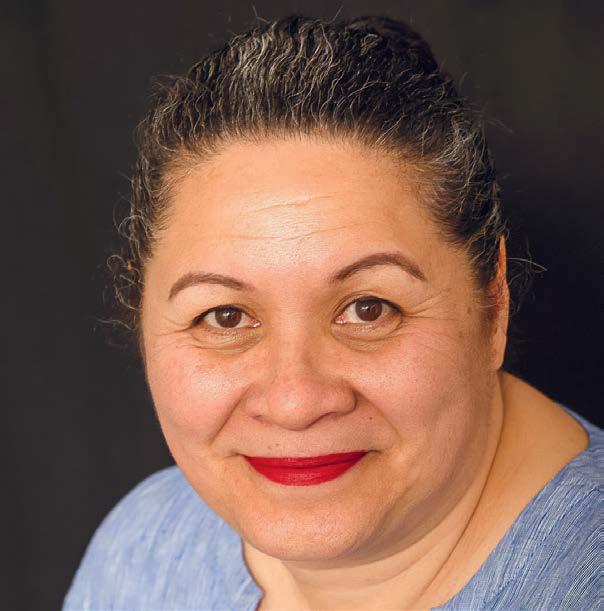
denied her particularity: the church already knew the place of diversity before it had ever encountered indigenous peoples.
With the theme, “Pilgrims of the Spirit”, and in sustained conversation with Moderator-elect Rev Salesi Faupula, the Bible studies will investigate a theology of difference.
To be Pilgrims of the Spirit is to be a community in which the encounter with difference and learning from particularity is the very basis of its place in the world as the body of Jesus Christ in his “own strange way”.
John Flett
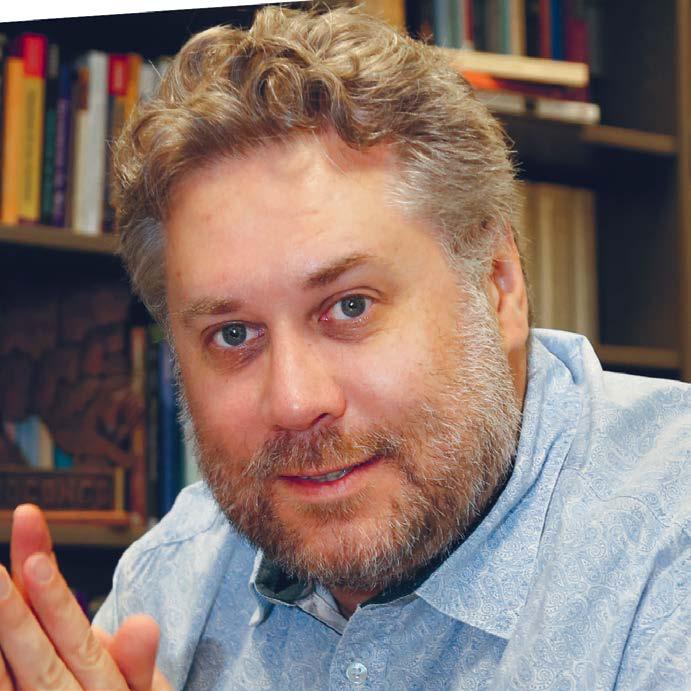
David signs off, with thanks
Rev David Fotheringham will finish his term as Moderator at the end of August, passing the baton on to Rev Salesi Faupula. In a Q and A session with Crosslight, David reflects on his three years as Moderator, and some of the joys and challenges associated with the role.
How would you best sum up your time as Moderator?
Deeply engaging and immensely fulfilling. I’ve been privileged to see an enormous variety of the worship, witness and service of the Uniting Church. God calls people in worship and service in such a wonderful variety of ways. The Synod’s Vision statement really captures it for me: it’s about following Christ first of all, with all the joy and challenge that comes with following the risen, crucified One, in the love of God. It’s been about walking with First and Second Peoples together, which I have deeply appreciated in all of the ways of working with members of the Victorian, Tasmanian and national congresses. It’s been about community, compassion and justice for all creation, which I see in so many amazing ways. That’s what it’s been for me. But I’m also deeply aware that through this period there have been various communities, congregations and presbyteries working through some tough challenges and changing circumstances, and I’ve found accompanying some of those journeys to be particularly significant. There has been grief for some, growth for some, and challenges to hear God’s call in new situations for many.
What have been aspects of the role that have given you most joy?
I’ve really enjoyed conversations with people in various congregations that I’ve visited, or at events like the ‘Feast of Faith’ event for young CALD leaders. I’ve been delighted by the ways that I’ve seen staff and volunteers with Uniting AgeWell and Uniting Vic.Tas engaging with their communities. And I’ve deeply enjoyed working with colleagues across a range of councils of the Church and all those who work “behind the scenes” in the Synod offices.
What have been some of the challenges involved?
A personal challenge has been trying to keep up contact across a range of councils and individuals across the Church, as much as I’ve been able to manage. A more particular challenge, which has taken various forms, has been helping people within various councils of the Church to trust one another in discernment processes, as we work and share together in God’s blessing and calling in the work of the gospel.
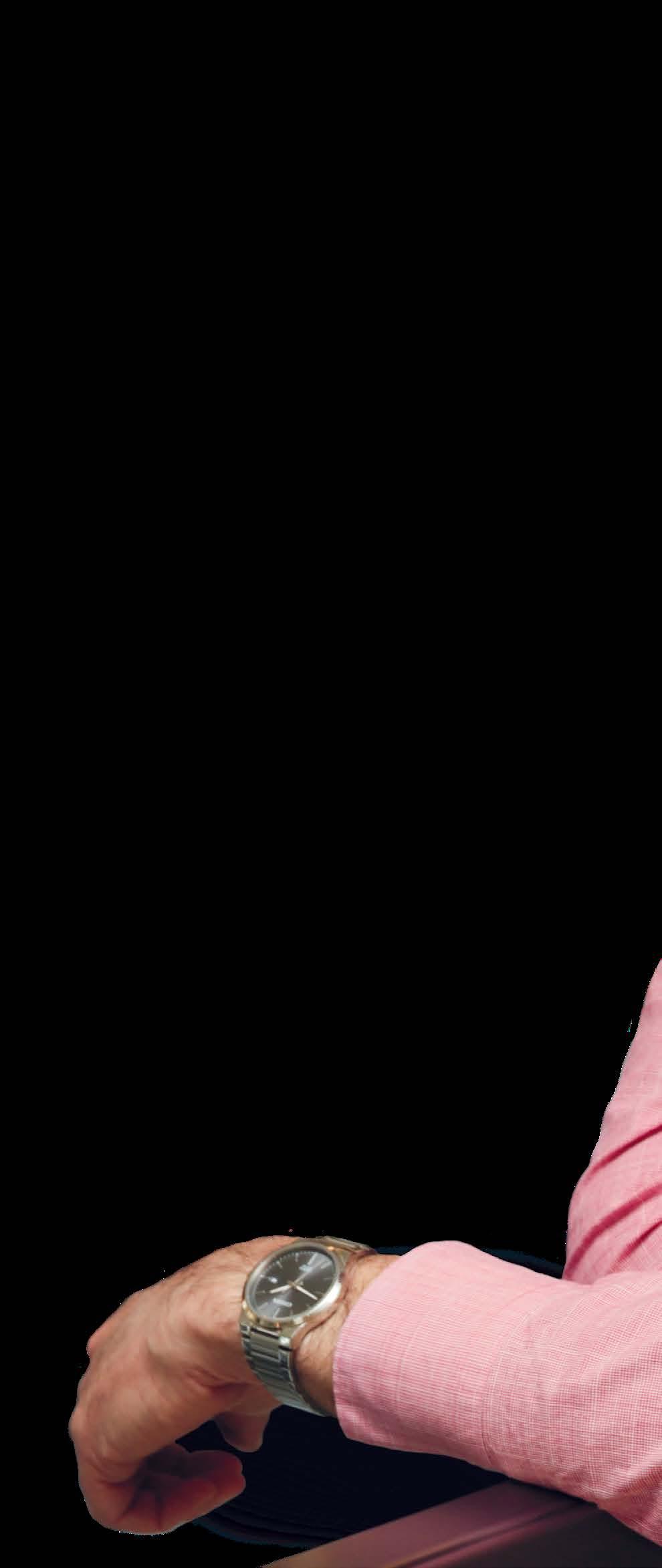

and immensely fulfilling.
Rev David Fotheringham describes his time as Moderator as deeply engaging
Image: Carl Rainer
The conflict in Gaza and events since October 7, 2023 have been in the background during your time as Moderator. Have you found responding to those events a particular challenge?
Absolutely. It’s terrible that over a long time, peoples with different histories in that land have not been able to find a lasting and just peace. The war crimes being committed by the Israel Defence Forces; the atrocities committed on October 7, 2023; the taking of hostages; and the withholding of humanitarian aid for so many people, with so many killed and displaced, is all horrendous. As a Church committed to peacemaking and to supporting peace-makers, it remains a challenge to speak for peace and for equal justice, without going to extreme ‘solutions’ being promoted by some on either side. I’m grateful for supportive work from the Justice and International Mission cluster of the Synod, for the statements that the national Assembly and ecumenical bodies have been able to make, and for local congregations working for peace in their own neighbourhoods. On a local level (as opposed to internationally), even working with bodies like the Victorian Multifaith Advisory Group has had serious challenges, but staying with and working with others in that space continues to be worth the effort.
What other major events or issues might have occupied your thinking most during your time as Moderator?
I have really enjoyed working with the Tasmanian and Victorian congresses, led by Alison Overeem and Will Pickett. That’s been high in my thinking during most of my time, but being approached by the Yoorrook Justice Commission to give an account of the ways that the Uniting Church and its ‘predecessor’ churches were involved in the activities of missions, and benefitted from the dispossession of First Peoples through colonisation, and subsequently responding has been the
Faithful Futures has been an important body of work you have formulated during your time as Moderator. Two questions here: How important has that work been and how can it be best embraced by Victorian and Tasmanian UC members, congregations and faith communities?
I think that there is a lot gained by presbyteries working on common goals together, even if in their own ways, because we’ve been facing similar challenges with many common elements in strategic planning, and it helps the whole Church to respond to actual and developing needs. The Faithful Futures
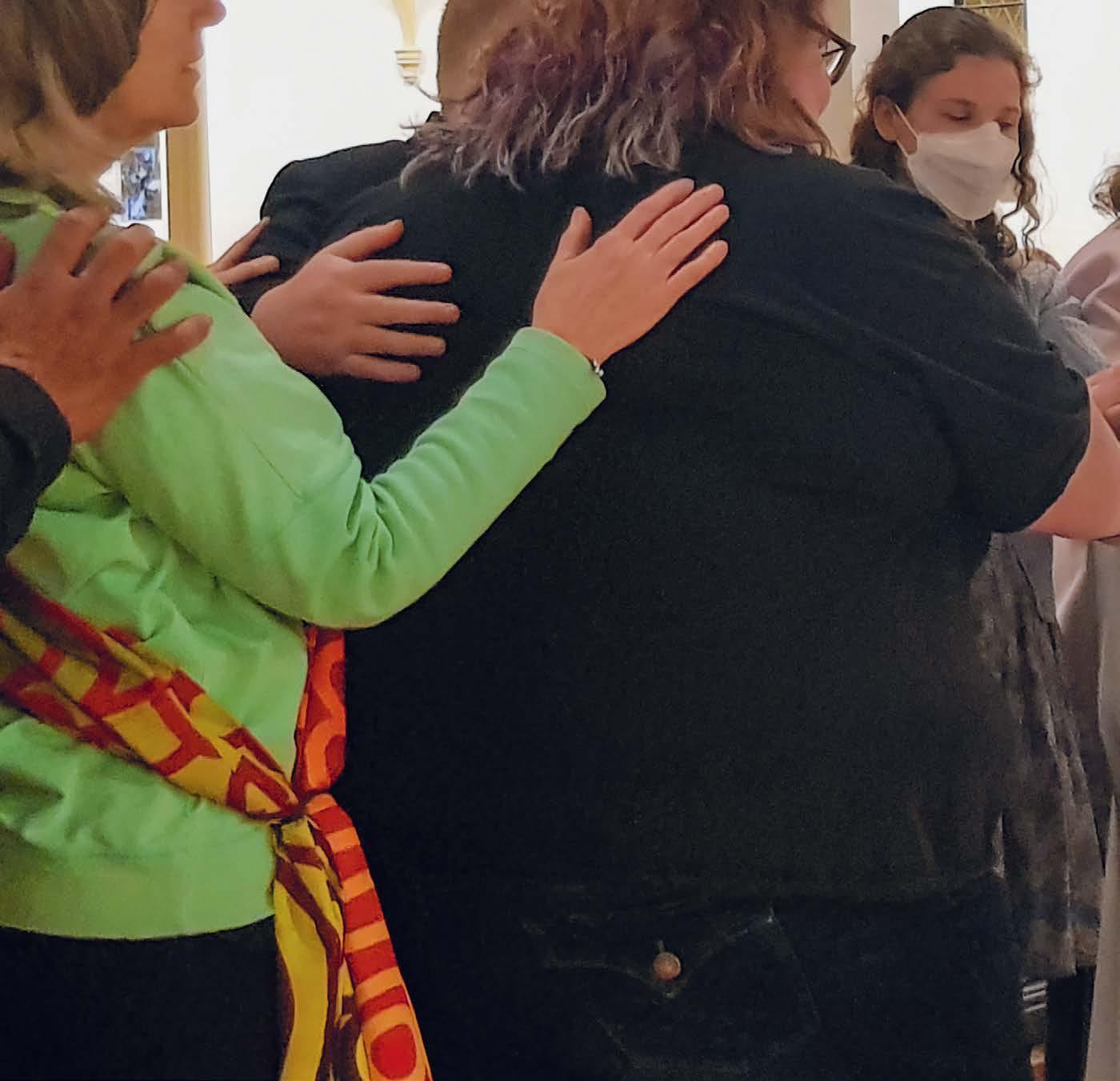
How would you describe the health of the Uniting Church in Victoria and Tasmania as you leave the role of Moderator?
By the grace of God, the Uniting Church in this Synod is a wonderful, amazing community. There are plenty of life-filled and life-giving congregations, activities and people. There are parts where changes are causing grief, and difficult decisions are needing to be made and supported in different ways. Overall though I think we reflect Jesus’ love, grace and priorities well, and I pray that we may continue to do so.
What about at a national level?
Very similar things could be said nationally as in Victoria and Tasmania. Within this Synod we have lots of common joys and challenges across presbyteries with different strengths and capacities. The same can be said nationally. The Uniting Church has a particular calling within Australia. We have a particularly broad, inclusive, Jesus-following and justice-aware approach to worship, witness and service that I’m glad to celebrate.
What are the issues that need serious attention at both Victorian/ Tasmanian and national level?
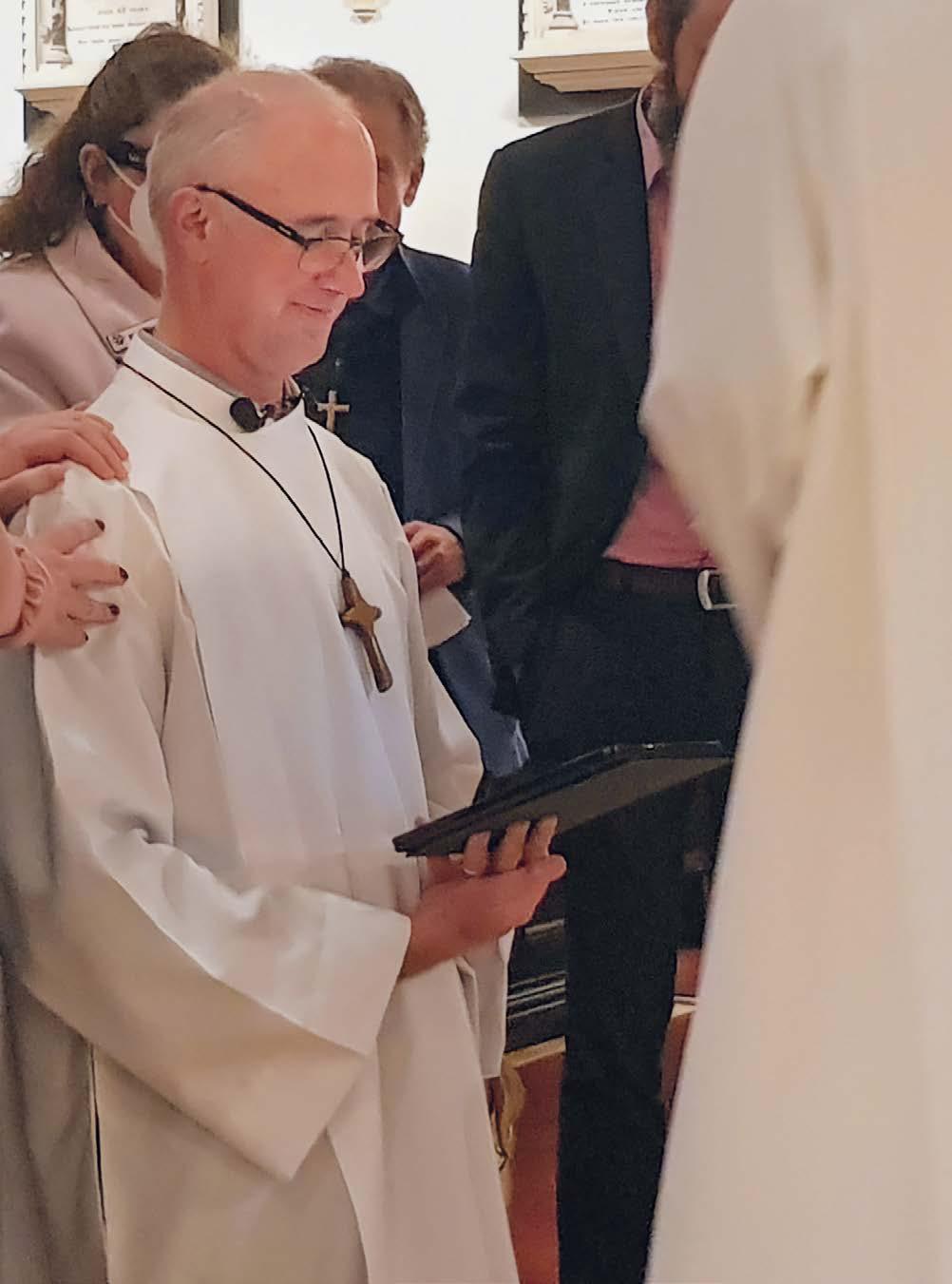
Would you offer any advice, or reflections, to incoming Moderator, Rev Salesi Faupula, that might assist him in the role?
Pray, and listen carefully for where God is calling you to pay attention. And delight in the wonderful people you will find in all corners of the Church and its institutions.
What are your future plans?
At a local level, it’s about bearing the gifts of the Spirit and growing people in discipleship and faith – and encouraging people who may be being called into particular ministries. At a slightly higher
among committees and councils of the Church. We need to grow that leadership
thoughtful about how responsibilities are distributed. Both Faithful Futures and
My immediate plans will be for some retreat time, and the chance to slow down a bit for personal discerning. With the things that I’ve learnt (and am still learning) about the way that the Church is organised, I’m looking forward to spending a couple of days per week as chairperson of the Assembly’s Commission on Governance, Resourcing and Administration, to further some of the Act2 work. Alongside that, there’s an opportunity to get back to some pastoral ministry through doing some part-time supply… or at least that’s the current plan. This role has been a wonderful experience and adventure, and I can only trust in God’s care for whatever is to come.
“By the grace of God, the Uniting Church in this Synod is a wonderful, amazing community,” says Rev David Fotheringham.
Human rights underpin changes for
older Australians
The Aged Care Act 2024 will become law on November 1, meaning some major changes within the aged care sector. Uniting AgeWell has a wealth of information and expertise to pass on to aged care customers about the changes.
By Natalie Dillon
Known as Baby Boomers, over 5.6 million Australians were born during the mid-20th century baby boom that followed the end of World War II, between 1946 and 1964.
Now aged between 60 and 78 and representing approximately 21.5 per cent of the total Australian population, this generation has, throughout their lifetime, demanded change in the way services rise to meet their needs.
For the aged care sector, the time for transformation to meet the needs of this generation is now. Yet it’s been a slow burn.
After the Royal Commission into Aged Care Quality and Safety, many years of investigation, consultation and significant advocacy, a new Aged Care Act 2024 (the Act) will finally come into effect on November 1, bringing with it a range of reforms to enforce the rights of older people, improve equity and access to services and sharpen the focus on financial viability and accountability for aged care providers.
While the reforms are aspirational in their mission to place older Australians at the centre of service delivery, the steps to realise a functional and sustainable aged care system are both complicated and necessary.
A sustainable system for a generation and beyond
Uniting AgeWell, together with the UnitingCare Australia (UCA) network, has actively advocated for older people and sought to embrace the challenges and opportunities of change to help shape the future of aged care in this country.
In 2024, the aged care sector in Australia was at an impasse, with a financial injection desperately needed, including an increase to the minimum wage for many aged care workers to combat the chronic workforce shortage.
UCA network leaders, including Uniting AgeWell Board Chair Raelene Thompson and CEO Andrew Kinnersly, brought their voices to Canberra in September last year to lead conversation and advocacy on a range of social and community issues, with aged care being a central point of discussion.
The UCA network CEOs including Andrew, then met with political leaders and their senior staff, taking every opportunity to discuss the importance
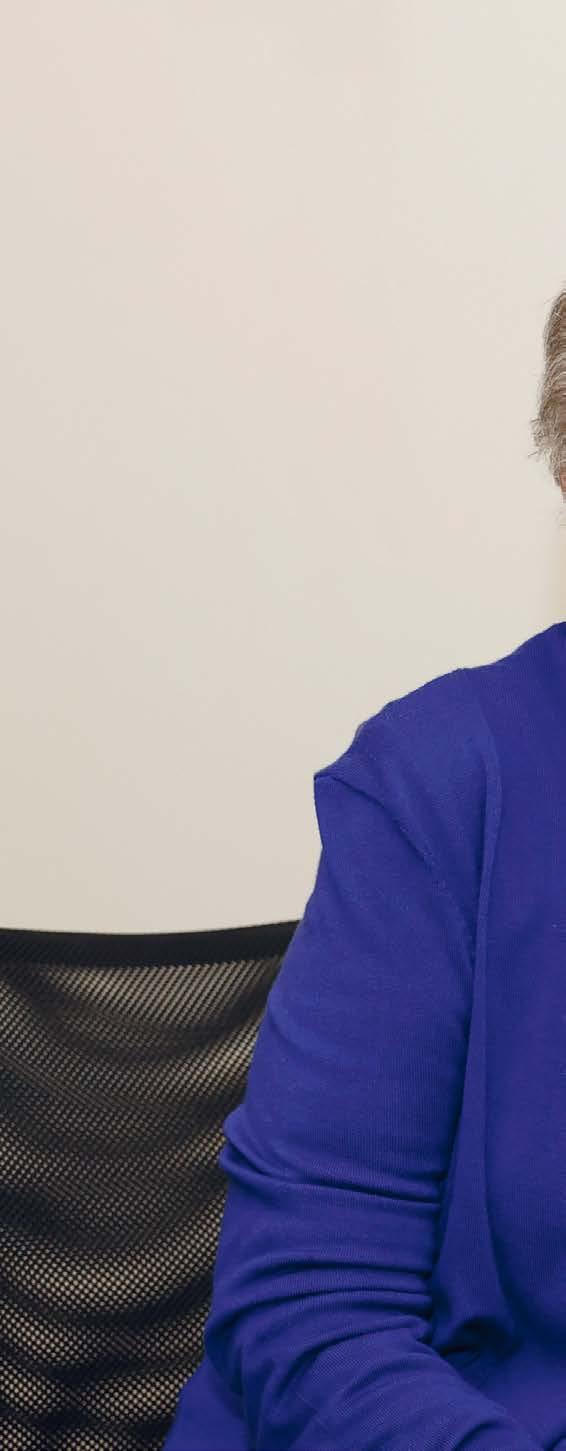
of introducing a new Aged Care Act as an urgent priority to open the door to much-needed reform.
Perhaps coincidentally, the following day the Federal Government announced it would indeed table the new Act to Parliament, with bipartisan support from the Coalition. The following month, on behalf of the network, Andrew addressed the fourth Public Hearing of the Community Affairs Legislative Committee on the Aged Care Bill 2024 to contribute to the final adjustments to the new Act.
“Older Australians deserve highquality aged care services, and they deserve these services when and where they need them,” Andrew says.
“The new Aged Care Act is a very important step towards creating a viable and sustainable aged care system that meets the growing needs of our ageing population.
Marilyn (Mazza) Bennet owns and runs Radio 88FM for Seniors in Castlemaine. Also a home care customer, she met Uniting AgeWell CEO Andrew Kinnersly at the opening of the Uniting AgeWell Castlemaine office.
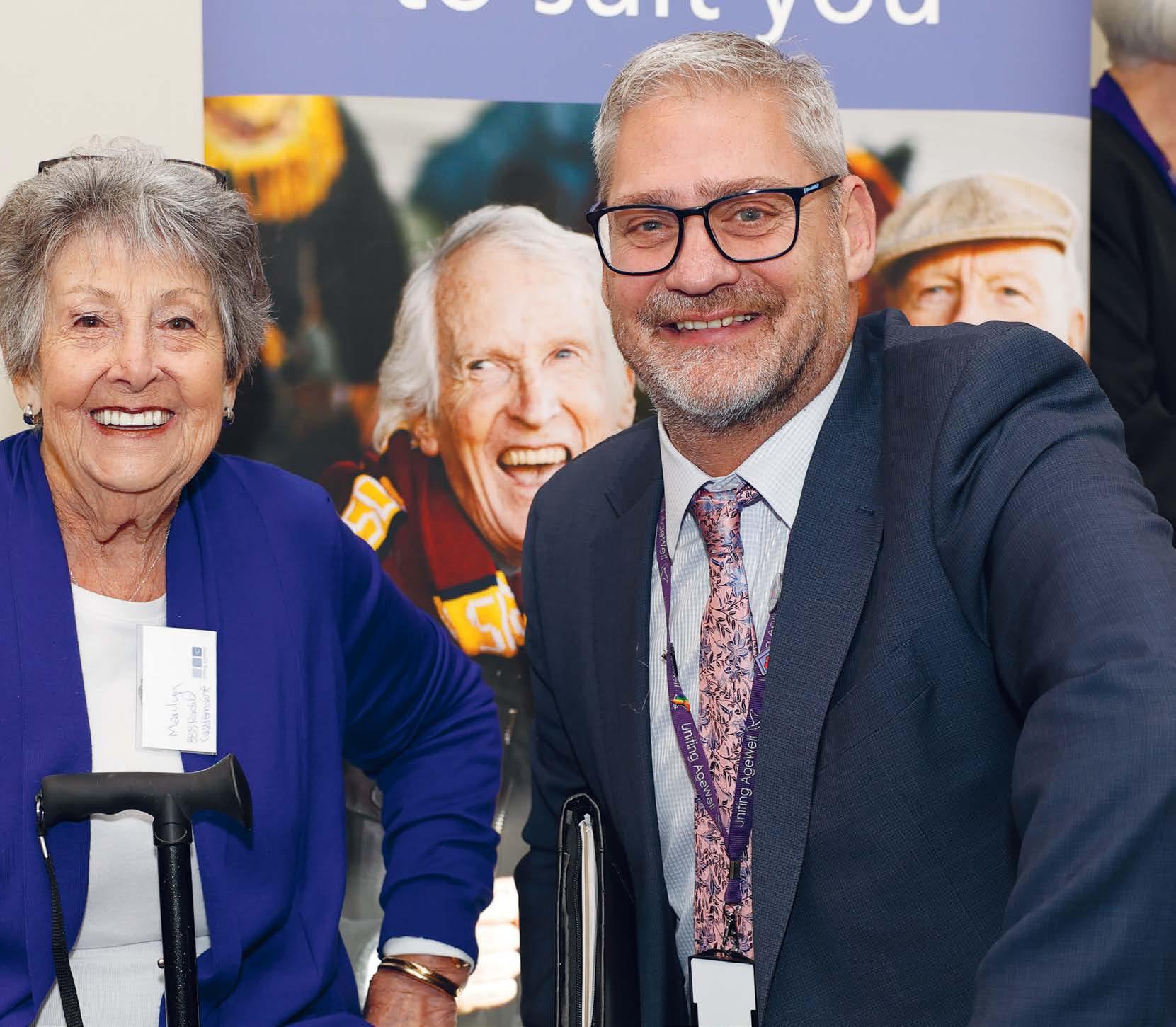
“I've always thought, and many people have thought, that older Australians deserve a five-star aged care system.
“Providers can't deliver that with a two to three-star level of funding, and that's something I think has been well addressed in the development of the Act to make the system more sustainable.
“Better financial outcomes for providers can lead to better resourcing, improved investment in facilities infrastructure, more staff employed, and greater staff retention given the aged care workforce are now paid at a more appropriate level.
“We can also expect an increase in service levels and this will directly impact on the time people have to wait to tap into these services.”
What to expect
The Act shifts the focus to a rights-based framework, empowering older people
and emphasising their choices and needs. It aims to enhance aged care quality and safety, ensuring dignity and respect for older people and their carers, and introduces a Statement of Rights to ensure older people are treated fairly and respectfully.
The overall changes cover home care and residential aged care services and place the customer and their family front and centre of the services they need.
Under the Act, the Aged Care Quality Standards will be strengthened with the goal to improve the lives of older people accessing aged care services in their homes, community settings and in residential aged care and sharpen the accountability on aged care providers to deliver high-quality care.
Home care services will be delivered under the new Support at Home program, replacing Home Care Packages, and will eventually include
services currently funded under the Commonwealth Home Support Programme.
Home care services will be separated into three categories: clinical care, independence and everyday living, and there will be dementia and palliative care supplements available.
One of the biggest changes is that all customers will be required to contribute to the cost of their aged care services.
What you pay under Support at Home will depend on your income and assets and the types of services you need.
The good news is that the government will fully fund clinical care – including nursing, allied health, nutrition, clinical and restorative care management.
Fonda Voukelatos, Uniting AgeWell Deputy Chief Executive responsible for home and community care services, recognises the dual imperatives of the changes – the need to create an
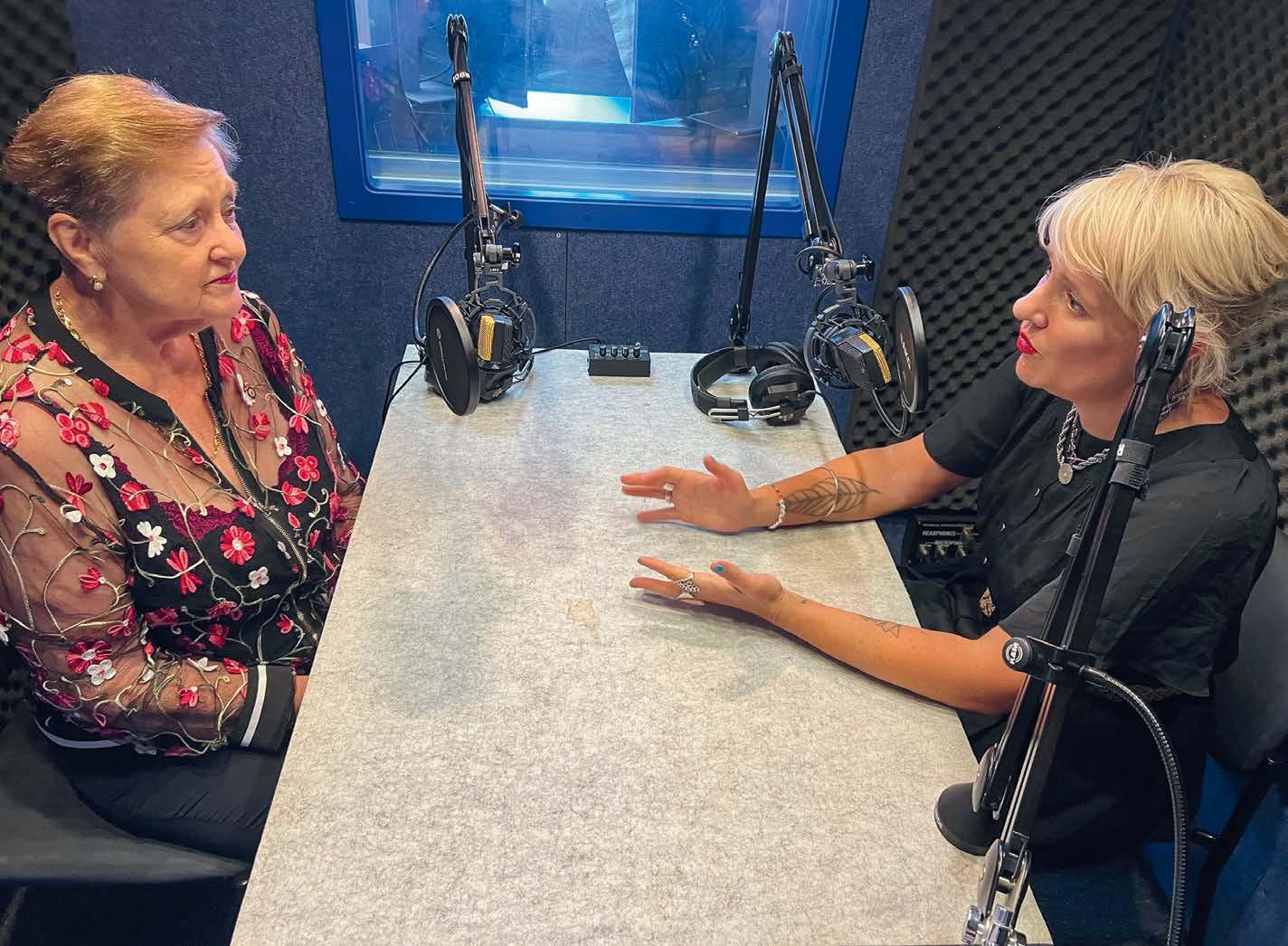
equitable system for all customers while ensuring well-managed service providers remain financially afloat.
“The reality is that not all aged care providers will be able to meet the demands of the new Act,” explains Fonda. He also notes that by responding to the demand for home care services, Uniting AgeWell’s growth in this area has been exponential, increasing by 300 per cent in revenue over the past five years, and growing from 5000 to over 15,000 home care customers served each year.
This growth also reflects the trust placed in Uniting AgeWell by customers, who recently voted it the most trusted brand for home care in Victoria and Tasmania in the 2025 Readers Digest Trusted Brands Survey.
changes to the aged care system they know, or start the journey of navigating this new system, Uniting AgeWell is supporting them through the changes that lie ahead.
Fonda anticipates that some people will find some of the information challenging.
“Our goal is to make information as accessible as possible and to work in partnership with our current and future
people can pop in for a cuppa and a chat.”
Customers’ voices matter
Providing people with the platform to voice their experiences, concerns, challenges and successes has underpinned the advocacy that has helped craft the new Act.
Uniting AgeWell’s podcast, ‘The Ageing Ideal’, launched in February this year, is also bringing the issues facing older Australian to the forefront of the conversations that will continue to shape change.
"Older Australians deserve high-quality aged care services, and they deserve these services when and where they need them."
Uniting AgeWell CEO Andrew Kinnersly
customers to ensure they get the best possible outcome,” he says.
“What matters most to us are the most vulnerable in society – older people,” says Fonda.
“We must meet the challenges of the future by continuing to do the right thing by our customers and respect their choices in absolutely everything we do.”
A helping hand
As many Australians begin to navigate
“We also know that while initiatives like our new website make it easier for people to find the services they need, and it’s easy to pick up the phone and speak to our customer care team, many people prefer face-to-face conversations about their care.
“It’s why we’re now hosting regular ‘drop-in’ sessions across all our home care offices and community hubs so
Hosted by ABC broadcaster and author Jacinta Parsons, ‘The Ageing Ideal’ is not just for seniors, it’s for anyone who wants to know more about how we can live and age well and challenge traditional perceptions of ageing and aged care.
It’s not how old you are, but how you are old that matters.
The name and concept for the podcast was the idea of Uniting AgeWell General Manager Marketing and Community Relations, Rebecca Ryan, in response to the need for real conversations about ageing and aged care, recognising how
Golden Days radio presenter Loretta Simmons (left) shares her perspective with Jacinta Parsons on growing older her way in episode one of ‘The Ageing Ideal’ podcast.
individual and unique those experiences can be.
“As an organisation working at the frontline to bring services to older people, we see first-hand what some of the challenges and joys of ageing are and some of the frustrations and concerns people have,” Rebecca says.
“It makes sense to create a platform where we can have authentic conversations, share experiences, improve awareness of services and supports and hopefully bring people along on the journey.”
To listen, search and follow ‘The Ageing Ideal’ on your favourite podcast app or find out more, go to www.unitingagewell.org/podcast
Ken’s an inspiration to others
Ken Lloyd barks with laughter at the thought of ever leaving his sprawling Greta beef farm where he’s lived for the past 25 years.
“Me – live in town? I wouldn’t know what to do with myself, it would drive me bloody mad,” the 85-year-old exclaims.
“The cars, the noise and all the people … just horrible.”
Ken loves being woken by the sounds of the cattle and the early morning chorus of the birds which act as an alarm clock for his first duty of the day, heading down to the paddocks in his ute to inspect the cattle and his horses, his beloved kelpie dogs coming along for the ride.
“I had a heart attack a few years ago and I never thought I’d reach this age,” laughs Ken.
“But here I am. I’m absolutely determined to carry on living here for the rest of my life.”
He’s on track to do just this, thanks to the government-funded home care services he receives through Uniting AgeWell. He’s been working closely with his care advisor Tina Manousaki to
Network meets vital need
The UnitingCare Australia Network is the national body for the Uniting Church’s community services.
It’s the largest network of social service providers in Australia, supporting 1.4 million people every year, across 1600 urban, rural, and remote communities. Its focus is on articulating and meeting the needs of people at all stages of life and those that are most vulnerable.
The UnitingCare network is also the largest not-for-profit aged care provider network in Australia, with services supporting approximately 97,000 older people, comprising 8.5 per cent of total residential beds and 10 per cent of Home Care Packages nationally.
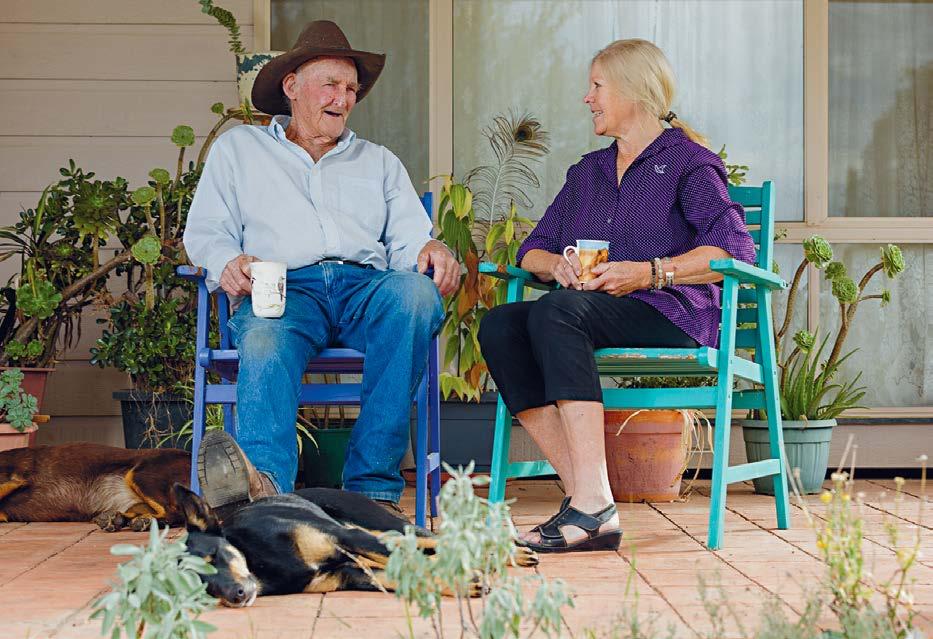
Ken Lloyd has been able to remain living at home thanks to the support of Uniting AgeWell and his care advisor Tina Manousaki.
ensure he has the right support and his home is safe and comfortable as he gets older.
Tina organised a personal alarm for him to wear, in case he falls and urgently needs help.
She also arranged for Ken to be assessed by an occupational therapist, resulting in the lounge room carpet,
And in sharing his story publicly in recent times, Ken’s experience is now inspiring others in regional Victoria and Tasmania to reach out and get a helping hand. supporting 1.4 million people every year
considered a tripping hazard, being replaced with floating floorboards. He also gets domestic help around the house.
Existential risk and the future of humanity
As
the pace of change continues at an alarming rate throughout the world, a growing field of inquiry is exploring existential risk, and the gravest threats currently facing mankind.
By Marina Williams
For as long as humans have recorded their fears, they have imagined the end of the world.
From ancient texts to futuristic forecasts, prophecies of destruction have echoed across time.
Whether framed in religious, philosophical or scientific terms, the idea that catastrophe may loom has shaped how societies understand their place in the universe.
Today, that age-old anxiety is taking on a new form – one grounded not in myth, but in risk modelling, probability theory and global systems science.
A growing field of inquiry, known as existential risk studies, is focused on the gravest dangers imaginable: those that could permanently curtail humanity’s potential or lead to its extinction.
From artificial intelligence to climate collapse, and bioengineered pandemics to nuclear war, these risks are no longer confined to the realm of science fiction.
They are real, say academics, ethicists and political leaders – and how we respond could define the future, or end it.
Understanding existential risk Oxford University senior researcher and author Toby Ord defines an existential risk as a risk that threatens the destruction of humanity’s long-term potential.


inadequate” annual budget of USD$2.1 million.
“Humanity spends more on ice cream every year than on ensuring that the technologies we develop do not destroy us.”
Historical parallels and prophetic warnings
Robyn Whitaker, Director of the Wesley Centre and Associate Professor of New Testament Studies at Pilgrim Theological College, points out that while the term “existential risk” may be new, the impulse behind it is ancient.
“There’s been a sense in almost every century that the world is ending,” she says. “We are not the first generation to feel the pressure of that.”
Robyn notes that apocalyptic Christian literature, particularly the Book of Revelation, should not be read as predictions but as acts of resistance.
“Apocalyptic Christian literature is often described as a type of resistance literature,” she says.
“It critiques the current world order. It might imagine catastrophe, but it also imagines that transformation is possible. That there is hope.”
That hope, she says, is not passive.
“Christian hope is not saying, ‘God will fix it’,” Robyn says. “Scripture consistently calls people to hold power to account and build a better world.”
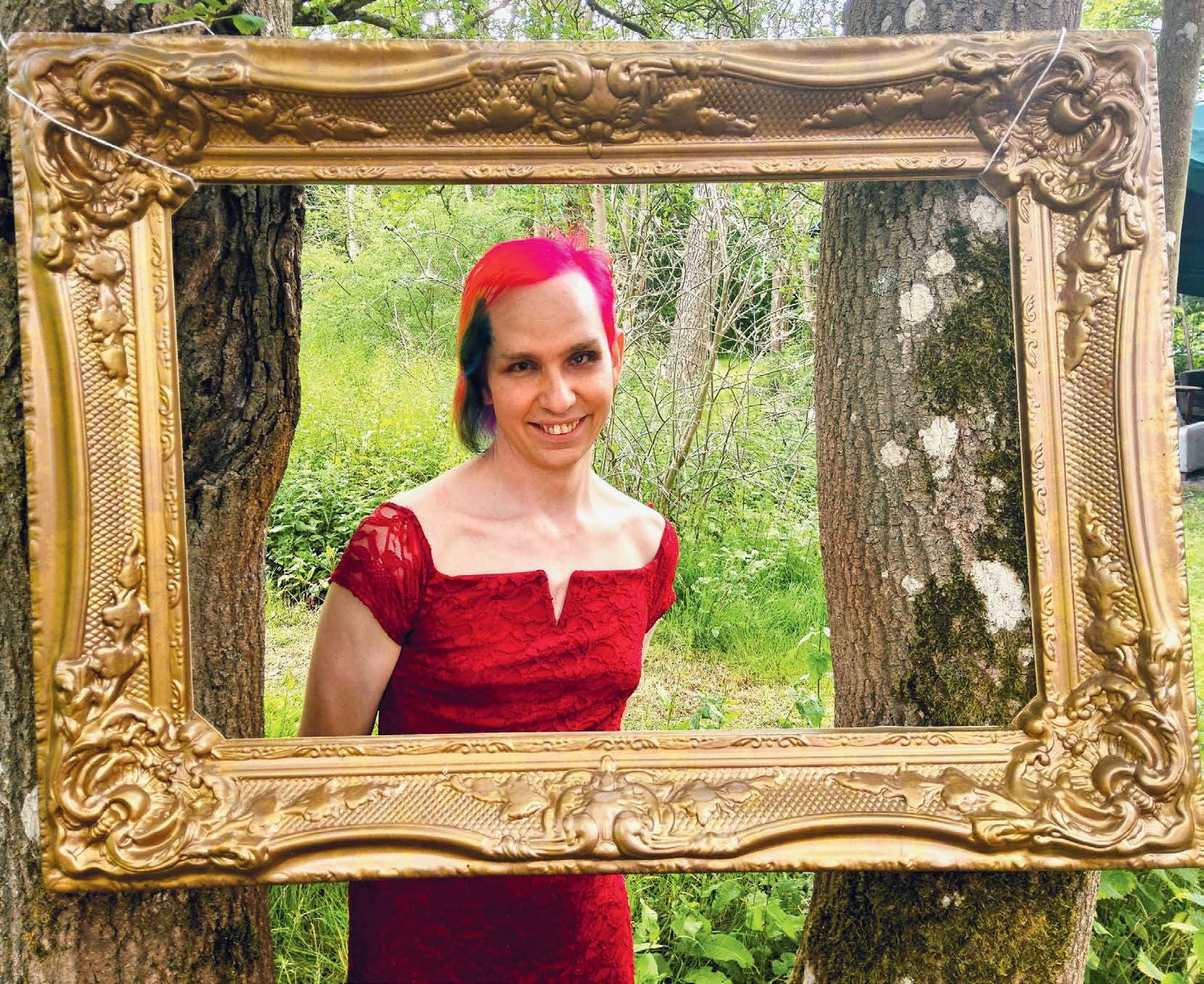
This sense of ethical responsibility – to act even when the future is uncertain – is central to existential risk thinking.
Robyn sees parallels between prophetic calls for justice and today’s scientific assessments of long-term threats.
Quantifying catastrophe
Toby believes rigorous thinking is needed to turn existential threats from vague fears into concrete areas of action.
His estimates are sobering: a one in 10 chance of catastrophe from artificial intelligence, one in 30 from engineered pandemics, and one in 1000 each from climate change and nuclear war.
“No one can say for sure,” Toby says, but he estimates humanity faces a onein-six chance of existential catastrophe this century.
“We cannot muddle through with trial and error but must be proactive.”
These figures are not intended to spark panic, but planning.
That means investing in governance
mechanisms that can detect, assess and mitigate risk before it escalates.
However, this could be easier said than done, particularly in a political environment that prioritises shortterm wins, says Andrew Leigh, Federal Assistant Minister for Productivity, Competition, Charities and Treasury.
Populism and the perils of shorttermism
The Member of Parliament and author is among a growing number of political leaders calling for more foresight in policymaking.
In his book ‘What’s the Worst That Could Happen?’, Andrew argues that populist movements, which often flourish on division and immediate grievances, make it harder to address existential risks.
“Populists demonise intellectuals, immigrants and the international order,” Andrew says.
“They thrive on short-termism ... they’re not preparing humanity for the
long-term threats that could wipe out everything.”
He calls for a renewed commitment to proactive governance.
“We’re not the main player in any of these catastrophic risks,” Andrew says of Australia, “but we’re an important, medium-sized economy, and we have a significant capacity to make the world safer.”
Like Toby, Andrew advocates for an intergenerational lens.
“We should value the wellbeing of future generations just as highly as we value the wellbeing of current generations,” he says.
Designing systems for the future
The way forward, says SJ Beard, lies in designing adaptive, participatory, globally co-ordinated systems.
“The public must be part of the conversation – not just consulted but empowered to shape the agenda,” they say. That includes reforms across education, media and democracy.
Researcher SJ Beard has been studying existential risk at Cambridge University for more than a decade.
From P21

“We need more documentaries, better journalism, better civic dialogue and science communication that goes beyond alarmism,” SJ says.
“And education systems that teach systems thinking from an early age.”
At CSER, this means scenario modelling, participatory research, and international advocacy aimed at building what SJ calls “existential hope” – the belief that the future can be safe, equitable and meaningful.
“We need to understand why people are making dangerous choices,” they explain, “so we use a variety of social science methods and systems thinking
" We cannot muddle through with trial and error but must be proactive."
Existential risk researcher Toby Ord
to identify the biggest drivers of risk, and we develop scenarios and work with dedicated advocates to show decision makers what could happen if they acted differently.”
The challenge, SJ adds, is not just scientific, but structural.
“At the moment, there are two or three academic centres that are working on this … people would be surprised at how little work is done on this topic,” they say.
“There isn’t enough of a knowledge base to back up policy. We need more work, more funding, more people.”
Rethinking governance
Addressing existential risk isn’t about preventing a single event, but about transforming how humanity governs, plans, and adapts.
International co-operation must become standard practice, SJ says.

Oxford University researcher Toby Ord’s work has informed global bodies and has resulted in the book, ‘The Precipice’.
“Scripture consistently calls people to hold power to account and build a better world,” says Pilgrim Theological College Associate Professor of New Testament Studies, Robyn Whitaker.

Whether in treaties on artificial intelligence, pandemic surveillance or climate agreements, collaboration must be seen not as diplomacy but as an investment in survival.
Yet collaboration requires institutions that are nimble and forward-thinking.
Toby argues that when the stakes are existential, systems of governance, whether democratic or technocratic, must be built to anticipate, not merely react.
SJ notes that while many governments now have national risk registers, these are often narrow in scope and based on short political time frames.
“By the time we get powerful AI, there may be nothing we can do,” they warn.
“It’s much easier to manage risk now, while the technology is still evolving, than later, when the costs of inaction are irreversible.”
Ethics must also guide policy, especially intergenerational ethics.
“Long-termism reminds us we are one page in a longer story,” Toby says.
“Safeguarding humanity’s potential
could be our most lasting contribution.”
The ethical view challenges leaders to consider not only what policies serve current voters but what legacy they leave behind.
“The number of generations that could follow us may dwarf those that have come before,” Andrew says.
“That places an extraordinary responsibility on those alive today.”
Public engagement and individual agency
Toby believes the individual has real power in reducing existential risk.
“We can all help in starting a public conversation about the long-term future of humanity: the breathtaking scale of what we can achieve, and the risks that threaten it all,” he says.
“We need this to be a mature, responsible, and constructive conversation: one focused on understanding problems and finding solutions.”
Without widespread public engagement, technical solutions and
ethical frameworks risk falling flat.
SJ argues that science communication, education and civic dialogue must go beyond alarmism toward constructive, participatory engagement.
For all its urgency, existential risk is not simply a catalogue of potential catastrophes.
It is also a generational invitation to choose wisely and act with foresight, SJ says.
It asks not only what we fear, but what kind of civilisation we wish to protect and what kind of ancestors we wish to become.
“Existential risk is not just about avoiding death, it’s about protecting life as something meaningful, equitable and enduring,” they say.
That idea is echoed by theologian Robyn, who sees continuity between prophetic religious tradition and today’s calls for systemic transformation.
“There’s a deep tradition of theological hope – not optimism, but a stubborn belief that even in crisis, transformation is possible,” she says.
From P23
Climate change, pandemics, artificial intelligence, and the fragility of democracies are all issues that require detailed exploration, argues Senior Social Justice Advocate Mark Zirnsak.
This idea of “existential hope” – that humanity can build futures worth living in – is central to how researchers like SJ frame their work.
“Working on the biggest risks makes you realise how much agency we have – if we use it,” they note. “People feel powerless, but they’re not.”
Toby, too, finds purpose in the scale of what humanity might still achieve.
“The best futures that are in our power to create make me strive to protect humanity’s potential through this most challenging time,” he says.
“It’s a meaningful way to engage and co-operate with fellow humans across the ages.”
Andrew sees it in political terms.
“Politicians must resist the
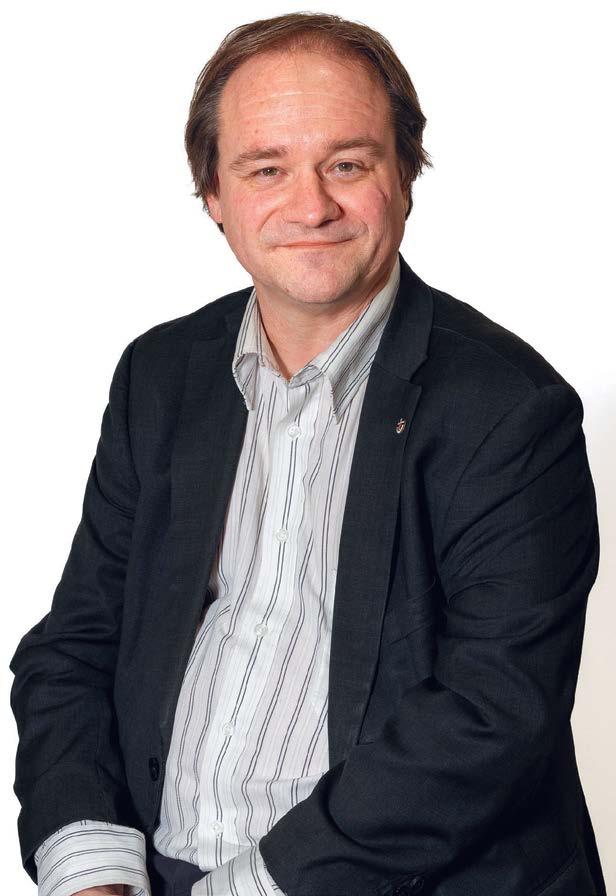
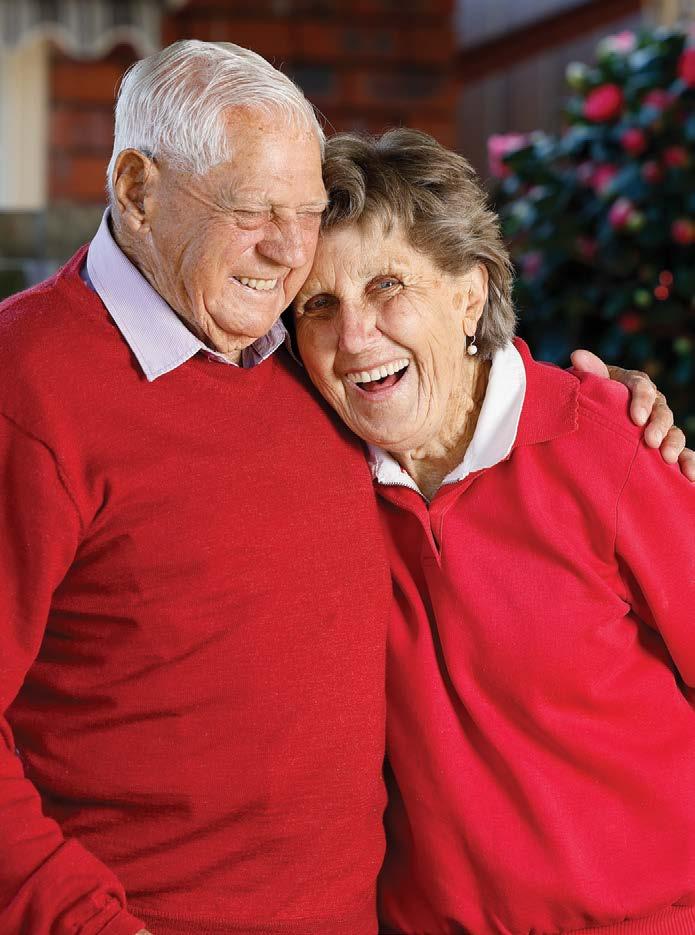

easy wins and plan for what matters most: the continuity of civilisation, and the conditions that make it worth sustaining,” he says.
Agrees Mark: “That future is still within reach but only if we choose to shape it, not leave it to chance, and in that choice lies the fate of generations yet to come.”
Ensuring all people have equal access to advocacy and education to understand local and global issues is key, he says.
“We plan to continue to provide church members with resources to take action calling for reforms that will provide a just, sustainable and flourishing future through our social justice network,” Mark says.
“We need to be part of making our voices heard on reforms that can ensure that future.”
Care and support tailored just for you with Uniting AgeWell
Help at home
Get assistance with personal and clinical care, household chores, assistive technology and transport
Community support and wellbeing
Remain connected with social groups, outings, health and therapy services, seniors gym and carer services
Independent living
Maintain an independent lifestyle in one of our vibrant retirement living communities
Residential care
Specialist 24/7 care and support, including dementia and palliative care and respite stays, within safe and caring communities
With services across Victoria and Tasmania, Uniting AgeWell's expert team can help you find the right services to meet your needs. Call us today!
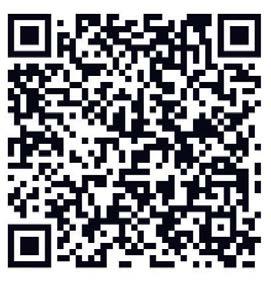

Every year thousands of people are impacted by emergencies in Victoria and Tasmania.
The Moderator’s Emergency Response Fund is a way for those of us wanting to help when current or future emergencies occur, and to contribute to communities in need of immediate assistance.
Funds may be used within the Synod of Victoria and Tasmania to provide:
Pastoral, ministry, and mission activities assisting the Church’s response to disasters, emergencies or other crises.
Support relevant councils of the Church to undertake disaster preparation/response programs/processes and partner with organisations in disaster preparation/response programs.
Scan the QR code with your smart phone to find out how you can donate today or visit the Synod’s website: www.victas.uca.org.au
“Churches can play a constructive and supportive role … taking on oppressive regimes or brutal foreign occupation.”
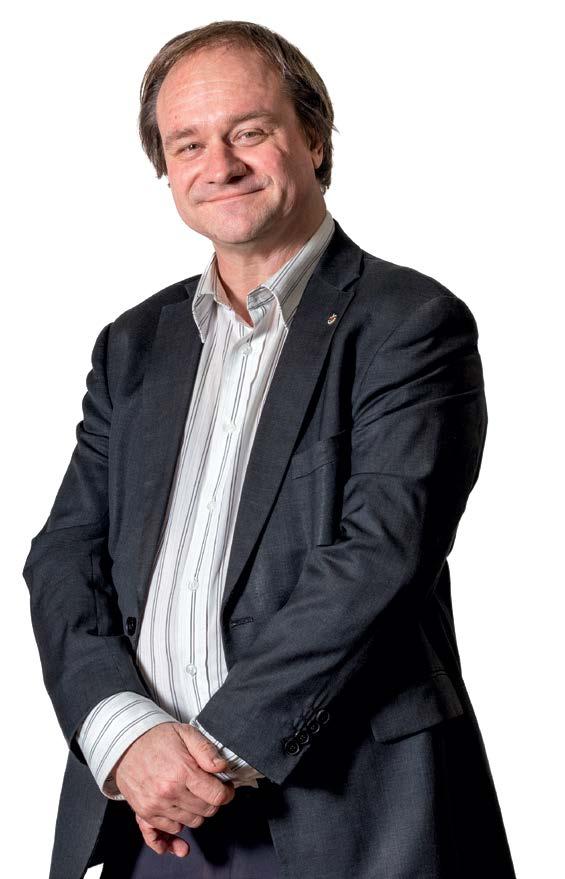
Senior Social Justice Advocate
“Blessed are the peacemakers, for they will be called children of God.” Matthew 5:9
The Jesus of the Gospels lived under the brutal occupation of the Roman Empire. He speaks of peacemaking, love of enemies (Mt 5:43-48, Luke 6:27-36) and that those who live by the sword will die by the sword (Mt 26:52).
In the face of oppression by certain religious leaders, he engaged in symbolic acts of non-violent resistance, such as healing on the Sabbath and overturning the tables of the money changers at the temple.
Jesus engages in what we would see today as a non-violent movement for reform, which ultimately sees him executed by the authorities he challenges.
Mark and Paul Engler, in their 2016 work on non-violent campaigning, ‘This is an Uprising’, point to evidence that highlighting injustice through a public willingness to sacrifice builds movements today. So, it turns out Jesus was on to something.
In 2011, Erica Chenoweth and Maria Stephan published a groundbreaking study into armed and non-violent resistance movements.
In short, they found non-violent resistance movements were far more likely to succeed than their counterparts that relied on killing.
Further, they were way more likely to lead to functional democracies, while armed struggle would be far more likely to result in brutal dictatorships and a return to civil war.
Chenoweth and Stephan examined 223 armed and 100 non-violent resistance movements between 1900 and 2006 in their book ‘Why Civil Resistance Works’. They excluded wars between governments in their study. They found non-violent movements were nearly twice as likely to succeed as those relying on armed conflict, as it was easier and less risky for people to support a non-violent movement.
Chenoweth and Stephan found that
in 57 per cent of cases, a country was a functioning democracy five years after a non-violent campaign succeeded.
Among countries already democratic when the non-violent resistance campaign occurred, 82 per cent remained democracies after the nonviolent campaign succeeded.
By contrast, only three of 55 successful armed struggles established a functioning democracy. Many of those who carry out armed struggle get used to the idea that to make the world a better place, you need to kill the people who oppose you. Once in power, it becomes hard to shake off that idea.
When it comes to external support, Chenoweth and Stephan published a booklet in 2021, ‘The Role of External Support in Nonviolent Campaigns. Poisoned Chalice or Holy Grail?’.
They found external support that provides training in non-violent tactics and small amounts of flexible funding can play a positive role in the success of non-violent movements. International sanctions also boost the likelihood of success for a non-violent movement.
For armed resistance movements, they found that the actions of external parties to support the armed struggle had little or no impact on the conflict. Only military assistance from a foreign government could make a real difference.
For example, think of US military support to the Afghan Mujahideen against the Russian occupation which led to the rise of the Taliban.
Statements of solidarity by external parties for the armed struggle were likely to embolden the armed resistance movement to take greater unnecessary risks. The result was more deaths (particularly of their own forces) without influencing the outcome of the conflict.
From the works of Chenoweth and Stephan, we learn that churches can play a constructive and supportive role for non-violent movements taking on oppressive regimes or brutal foreign occupation, especially through funding.
Pilgrim builds strong research reputation
As Pilgrim Theological College marks its 10th anniversary, Acting Head of College Philip Hughes outlines the important role the college plays in research.
At the heart of Pilgrim Theological College is its research activity.
Over the past 10 years of the life of the college, the research which has emerged has been very substantial.
All members of the academic faculty are active in research, and most are known internationally for the work they are doing.
Pilgrim staff are also involved in supervising research, and eight students are currently doing doctorates through the college.
Research is immensely valuable.
While we are well aware of the benefits of medical research, which has enabled the world to deal with pandemics like Covid-19, it is also important in relation to theology, Biblical studies, and ministry.
Interestingly, sociologists such as Ronald Inglehart have shown that the dramatic decline that we have seen in church attendance is related to medical research, and particularly the decline in infant mortality.
The relationship between rates of infant mortality and religious faith is complex and other factors are also important. However, understanding these factors can help us to respond to our changed situation.
I have explored these factors in my recent book ‘What is Happening to Religion in Australia? Understanding the Trends’ (Coventry Press, 2025).
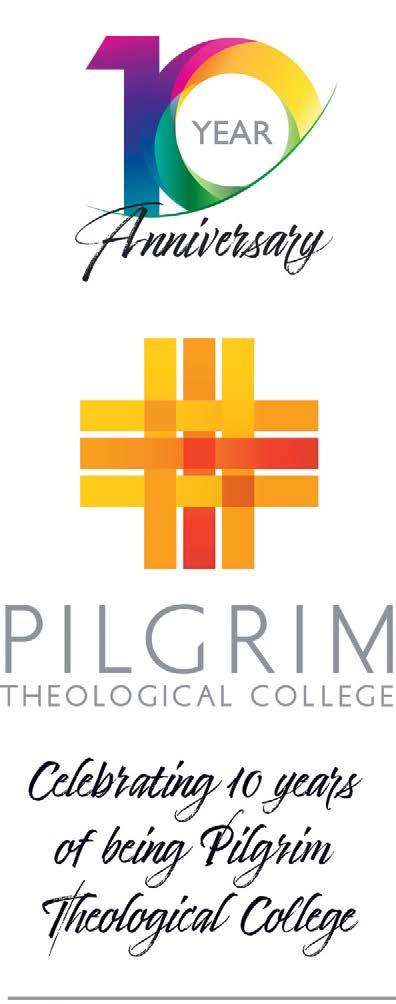
The amount of research conducted by the faculty at Pilgrim is immense, and I can only give a few examples.
Some of the other research which has been done at Pilgrim has focused on responding to the changed place of the church in our society.
Rev Dr Sally Douglas wrote ‘The Church as Salt’, arguing that the Church is no longer ‘triumphant’, but is called to be salt in society.
It does that as people seek justice and compassion among small groups and in the larger society.
Sally’s latest book is ‘Jesus Sophia’ (shortlisted for the Australian Christian Book of the Year in 2024).
Assoc Prof Kerrie Handasyde and former Pilgrim principal, Assoc Prof Sean Winter, have edited a book which seeks to identify some of the images of Christ which can be identified in Australian history.
Here and there, in the midst of stories of pioneers, in the ANZACs, even in the stories of the pop idols, we can glimpse something of the graciousness and, in some places, the suffering of Christ.
Rev Assoc Prof Robyn Whitaker has focused on the apocalyptic literature of the Bible and in 2023 published an introduction to the book of Revelation, ‘Revelation for Normal People’. The same year, she published a book on the understanding and interpretation of the Bible, ‘Even the Devil Quotes Scripture’.
Rev Assoc Prof Monica Melanchthon teaches the Hebrew Bible/Old Testament and seeks to bring its text
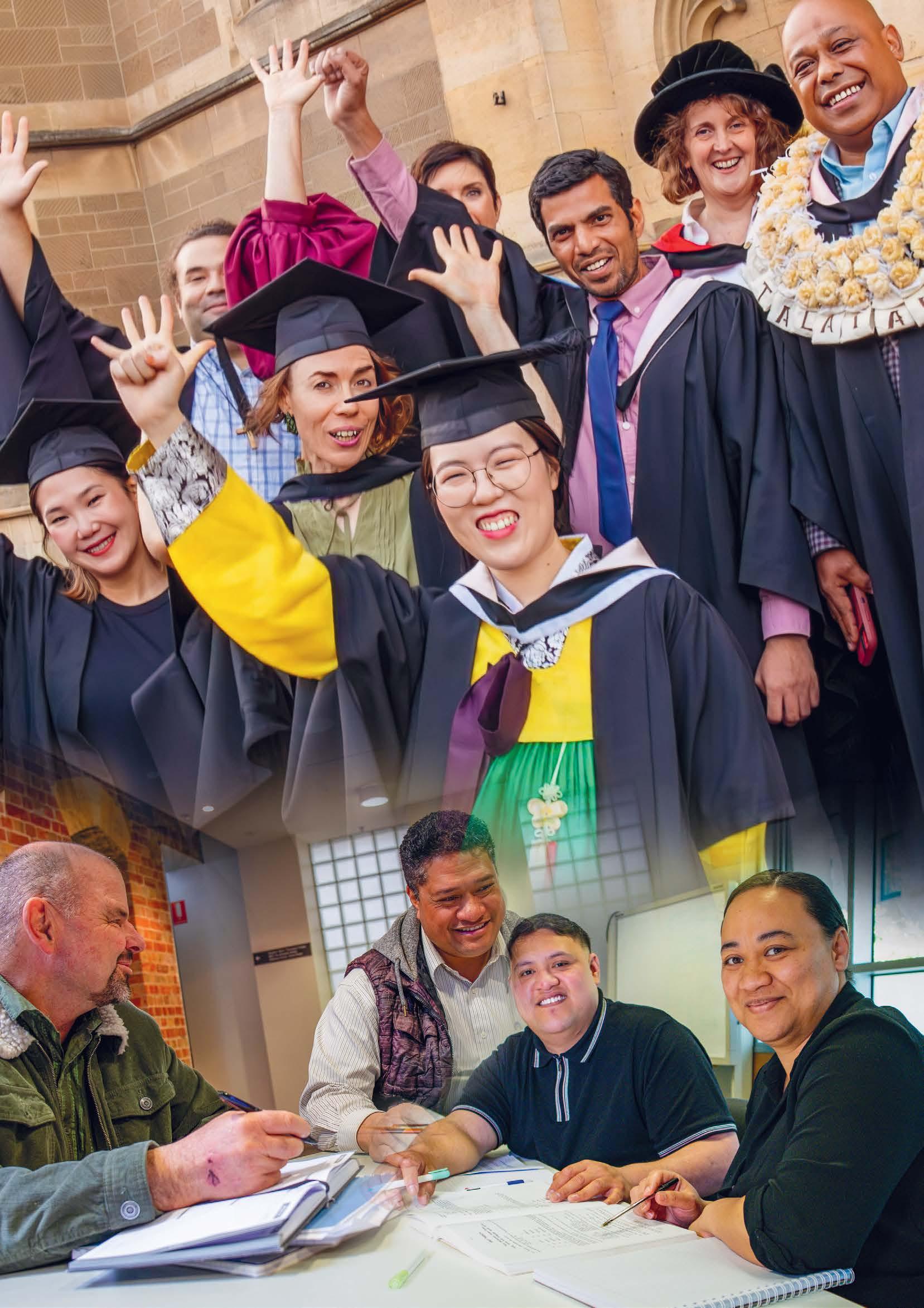
"Over the past 10 years of the life of the college, the research which has emerged has been very substantial."
Pilgrim Theological College Acting Head of College Philip Hughes
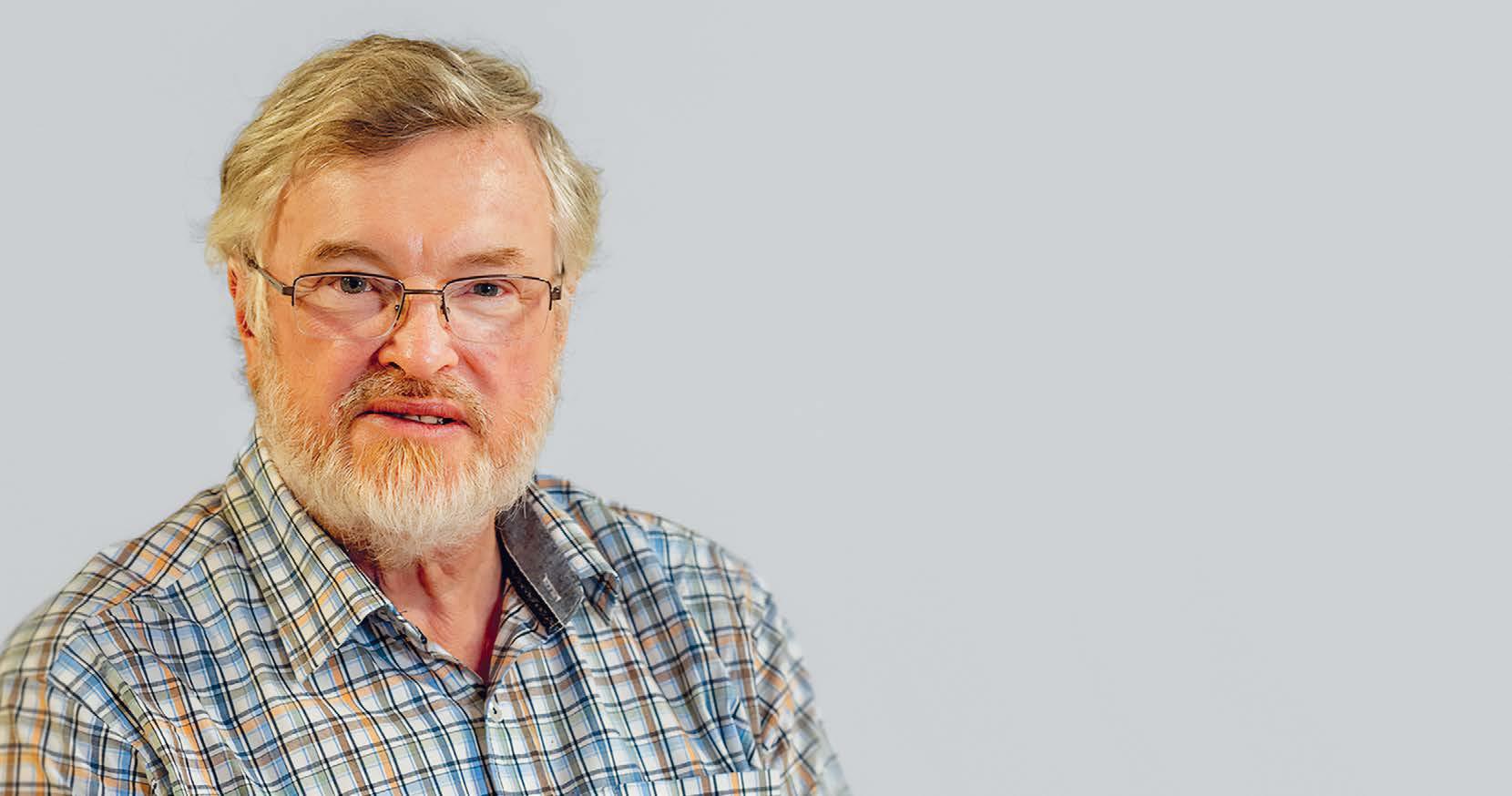
into conversation with issues of culture, gender, and social issues.
She draws on the experiences of marginalised people in interpreting the biblical text.
Later this year, she will be an invited speaker at the International Organisation for the Study of the Old Testament, speaking on how biblical exegesis is always both political and pastoral, illustrating that from Dalit feminist perspectives.
Rev Dr Daniel Sihombing is the most recent appointment to the faculty at Pilgrim.
He completed his doctorate in the Netherlands, in which he critically engaged the stance of three Indonesian theologians in relation to the Soeharto regime in the light of the teaching of Karl Barth. He will soon publish his thesis as a book.
Rev Prof John Flett has focused on how the culture, history and context, and embodied forms of faith in Oceania can better help us understand our own context, the cross-cultural transmission and appropriation of the Christian gospel.
Rev Prof Stephen Burns has published a number of articles and edited books on contemporary theology and liturgy, particularly feminist theologies.
The University of Divinity held a research day in June, and two of Pilgrim’s doctoral students presented.
Elizabeth Lee presented an important paper on how a church can respond to issues of trauma in the community while seeking to maintain its strong practice of hospitality.
Sarah Callista spoke about bringing Indonesian voices into dialogue with the Gospel of Mark. Other doctoral students are looking at the history of liturgy, the theology of pilgrimage, institutional responses to disability, the formation of the Churches of Christ, and Biblical accounts of what it means to be human.
While some students are doing doctorates so that they are better able to minister or to teach, for others it is a project for retirement.
It is a great way to spend one’s retirement drawing on one’s life experience and giving it back to the community in a significant way.
Several of my own doctoral students have been retired or semi-retired, such as Dr Leonie Bird, who graduated this year from the University of Divinity having completed an important piece of work on the implications for the churches of the Royal Commission into the Institutional Responses to Sexual Abuse.
A short version of her thesis is in the ‘Journal of Contemporary Ministry’, which is available free online at www. journalofcontemporaryministry.com
My current research project is on ‘communities of meaning’.
With a research team of seven people from across three University of Divinity colleges and three universities, as well as the Christian Research Association, we conducted 71 in-depth interviews with retired and semi-retired people to explore how their social connections contribute to a sense of meaning and purpose.
Looking at how the Christian faith
gives meaning we noted how, for some, it was the sense of personal connection with God. For others, the focus was on how faith gives values. As one man said:
“My whole worldview flows out of being Christian … and so you have the opportunity to build up relationships by serving and by being kind and helping, and so modelling a lot of those sorts of things that Jesus modelled.”
However, the key finding was the importance of those personal relationships which can develop in small groups, in devotional groups or mission groups, and sometimes even in a church council. One woman said:
“So in (Life) group we grow in our faith and knowledge of God … so we care for one another and sort of share life with each other. That’s the meaningful thing.”
The majority of church attenders whom we interviewed pointed to a small group of people where they felt they were valued and to which they felt they could contribute. A church service is not the key to meaning, it is rather the small group where each person is appreciated and where each can contribute.
Australian culture is diverse and rapidly changing.
It changes with immigrants arriving among us, and as the technology we use to perform everyday tasks changes.
To keep a track on these changes and their significance for personal faith and church life, research is needed.
Pilgrim Theological College is a dynamic centre for research, as well as teaching.
From P28
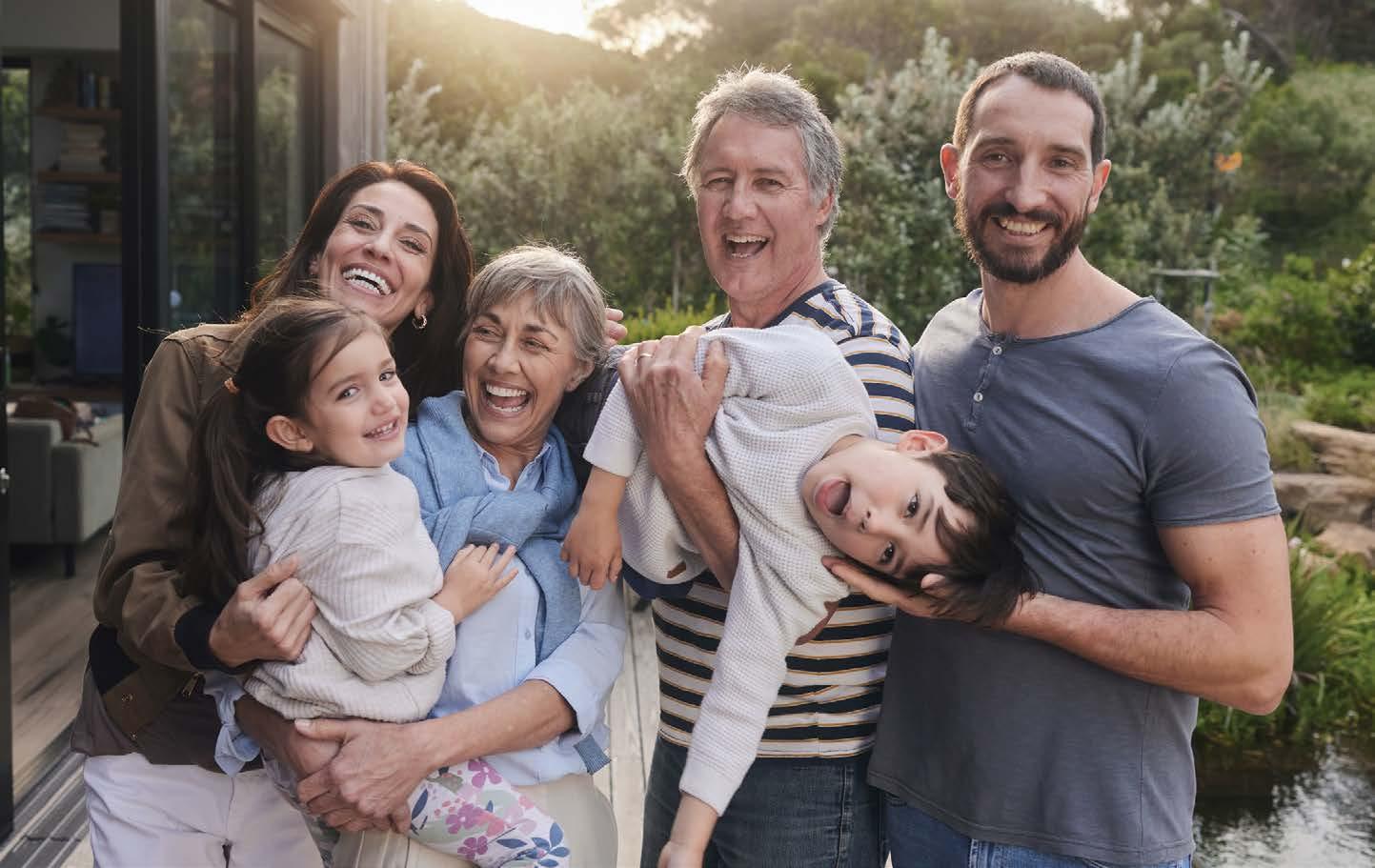

means
business
Rev Sandy Brodine from the Synod’s Younger Generations team attended the international Messy Church Conference 2025 in the United Kingdom in June. Sandy outlines some of the highlights of the conference and the reasons why Messy Church continues to thrive around the world.
A small team consisting of Rev Greg Ross from Western Australia, and myself, Chris Barnett, Bethany Broadstock and Sophia Byrne from Victoria, attended the conference.
Based on the theme of ‘All together’, the event highlighted inclusion and diversity in all its forms.
Keynote speaker Lorraine Prince led the way with a presentation on psychological safety and how we could ensure our Messy Churches were safe spaces for all people.
Asking the key question, “how do you know everyone feels like they belong?”, Lorraine challenged us to think carefully about our own Messy Churches and whether they were safe.
Reflecting on the South African concept of ‘Ubuntu’, which means “I am because we are”, Lorraine said that Messy Church theology should reflect God’s relationship with us, with others and with the whole of creation.
She encouraged us to see that “relationship first and product second” ought to be a core value for all church communities.
During the conference we had opportunities to attend workshops led by Messy Church leaders from around
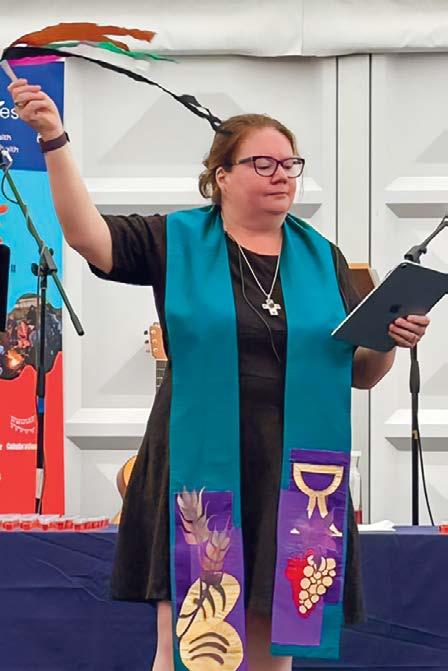
the world. I led a session called ‘Process art: encouraging shared meaning making to grow disciples’, in which participants engaged in their own piece of process art, painting on alfoil with a cotton bud. This is an art style where no one is the
artistic expert. I was delighted with the way the participants responded to the activity, and the artistic responses were all wildly different.
Some participants wanted to draw the story of Jesus calming the waves, and others were drawn in to the feeling of the story, wondering what it would have felt like to be caught in the stormy sea and have Jesus reach down to rescue them.
Other workshops included the ‘Theology of Messy Church’ and ‘Caring for those with autism in Messy Church’.
A definite highlight of the conference was a Ceilidh led by a ‘scratch band’ and Messy Church young leader Jonathan Bland.
Participants of all ages enjoyed dancing to the music, including the hymn ‘To Thine Be the Glory’.
Participants also had the opportunity to engage in two Messy Church sessions during the conference.
The first showcased the incredibly popular ‘Messy Church goes Wild’ outdoor Messy Church.
Leadership for the session was provided by people from across the Messy Church world, including a biblical reflection from Sweden and Guyana, and worship leadership from the Messy
Rev Sandy Brodine leads Communion during the international Messy Church conference.
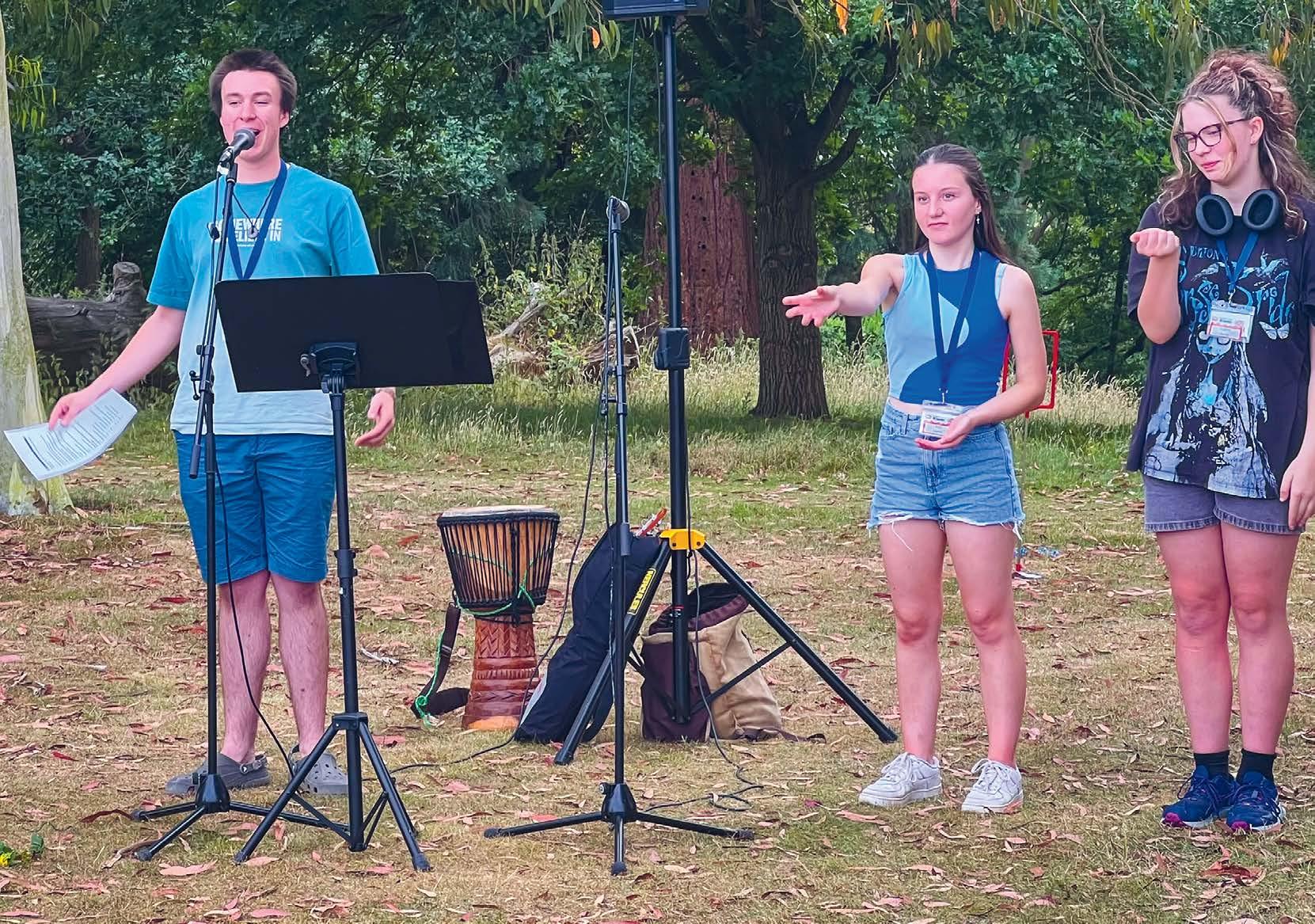
Church young leaders, including Sophia Byrne from Melbourne.
The second Messy Church session was based on Martyn Payne’s book ‘Messy Church: All Together’.
This included a brand-new Uniting Church in Australia-flavoured Communion liturgy by me designed to be inclusive of all ages, including children who are pre-readers.
Following on from the main conference was an opportunity for key leaders from across the world to gather and reflect on how Messy Church is developing in each of their countries.
The Messy Church movement thrives internationally because Messy Church has been designed to be modified to be culturally appropriate in different settings around the world.
It was particularly moving to hear how it has been modified to work in Africa, Scandinavia, the Netherlands and Germany.
The Messy Church Australia team is looking forward to working with churches across Australia, including the Uniting Church, to think about ways in which Messy Church can be adapted in culturally appropriate ways.
Whether you have been involved in
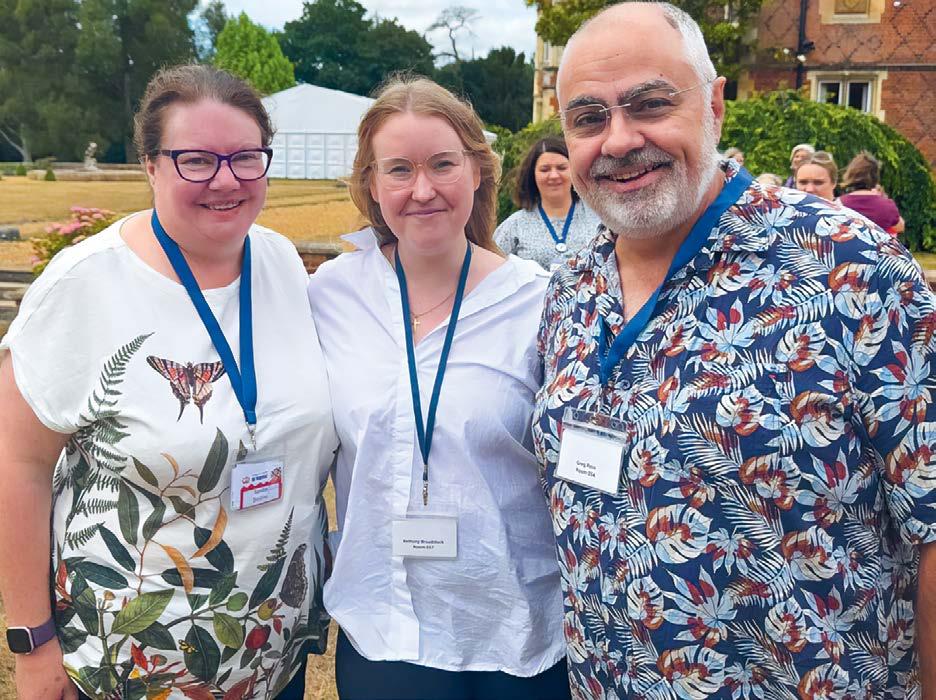
Messy Church for years, or have never heard of it at all, there was something to learn about the ways in which the Messy Church movement is growing and changing, and experimenting with new ways of being church for people across
the generations in new and creative ways.
If you would like to know more about how Messy Church could work in your community, contact Sandy at YGTeam@victas.uca.org.au
Messy Church young leaders, including Melbourne’s Sophia Byrne on the right, lead worship at Messy Church goes Wild.
Messy Church Australia leaders Rev Sandy Brodine, Bethany Broadstock and Rev Greg Ross at the conference.

Discernment Day
About
Come and see… An opportunity to learn about discernment, discipleship and ministries in the Uniting Church, and pathways into lay and ordained ministries.
• Meet UCA Ministry agents and learn about their different roles and contexts
• Discover educational pathways for discipleship and ministries
• Learn about the Period of Discernment and ministry pathways
• Consider how to discern your gifts and your sense of call
Register online at https://events.humanitix.com/ discernment-day
Centre for Theology and Ministry, 29 College Cres, Parkville VIC 3052
When 9:00 am – 4:00 pm, Saturday 25 October
Cost
$40 per person (in-person)
Free (online via Zoom)

New voice for disability inclusion
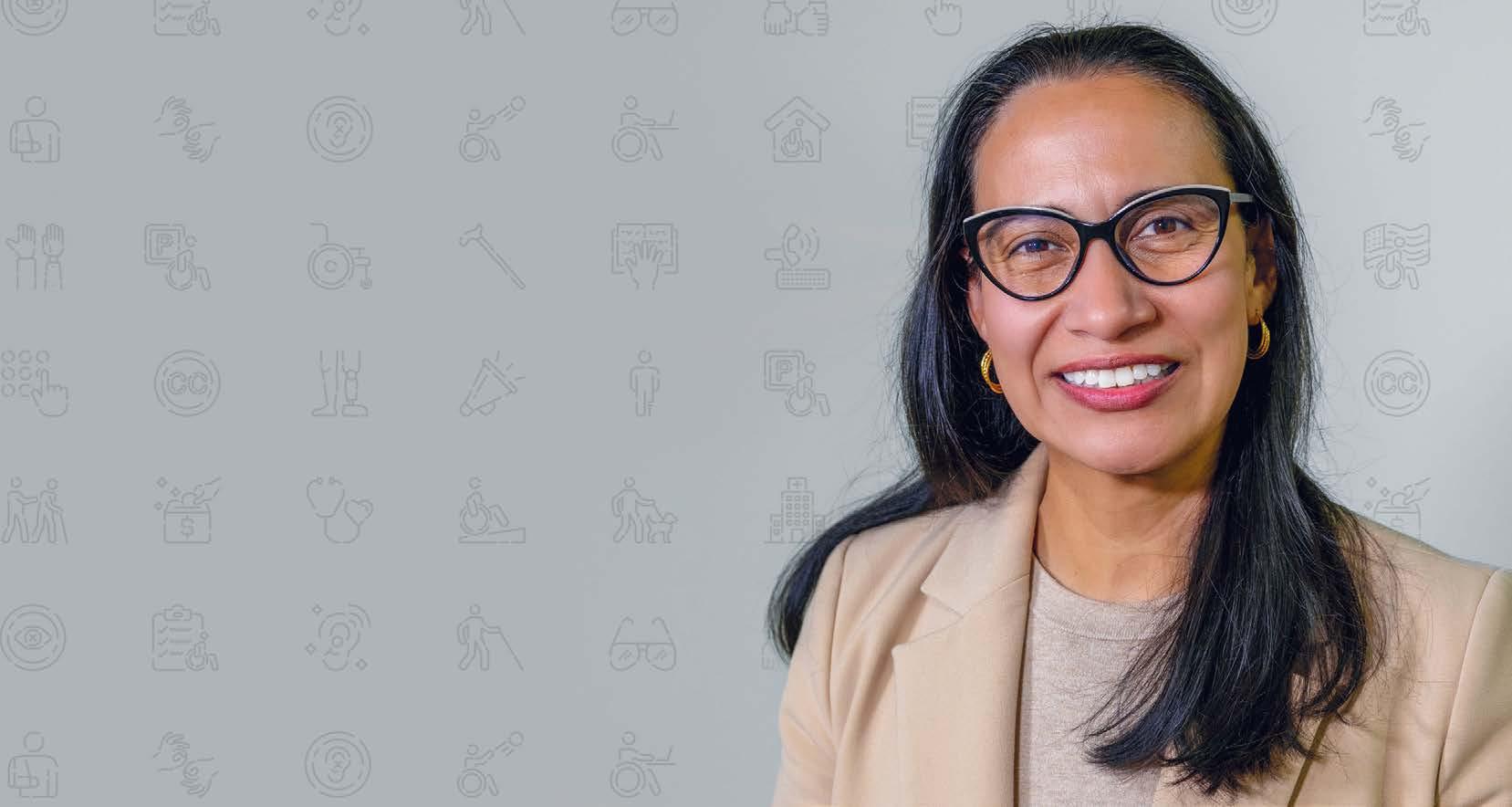
Elga Rodriguez recently stepped into the role of Disability Inclusion Advocate within the Synod of Victoria and Tasmania, replacing the long-serving Andy Calder. Elga outlines what she hopes to bring to the important role.
I am delighted to step into the role of Disability Inclusion Advocate for the Synod of Victoria and Tasmania, bringing with me over 12 years of experience in the disability sector.
I also have family experience of disability. Throughout my career, I have worked in systemic and individual advocacy, local government, and tertiary education, striving to ensure that people with disabilities are not only seen but meaningfully included in their communities.
Now, in this new role, I am committed to fostering safety, accessibility, empowerment, and belonging within the Synod, ensuring that all people, regardless of ability, can fully engage in the life and mission of our Church.
My path has been shaped by a deep commitment to equity and inclusion.
Over the years, I have supported individuals with blindness and low vision in achieving meaningful employment, ensuring their access needs were met and linking opportunities according to their career goals.
I have also worked in systemic advocacy, working to influence and change policies, procedures, and service delivery to create environments where people with disability can access services, exercise their rights, and engage fully in society.
I have assisted people with disabilities,
their families, and caregivers in navigating barriers to inclusion, ensuring they feel heard, supported, and valued.
My experience in local government and tertiary education has allowed me to collaborate with diverse communities and stakeholders to develop disability action plans, ensuring accessibility is not an afterthought but an integral part of planning and decision-making.
Working on multiple co-design projects, where the outcomes were more effective, has taught me the importance of working alongside people with lived experience of disability as a valued skill that strengthens design processes, ensuring solutions are practical and truly meet diverse needs.
As Disability Inclusion Advocate, my role is to ensure that the Synod remains true to its commitment to being welcoming and accessible to communities. This means:
Working alongside congregations, presbyteries, Synod Ministries and Operations to promote disability awareness, accessibility, and inclusion through the Synod Disability Action Plan and resources available.
Developing educational resources to support the implementation of the action plan.
Advocating for safe church environments for people with
disabilities and working with the Culture of Safety Unit.
Promoting awareness of communication tools that help everyone participate, like Braille, large print, Easy English, plain language, sign language (Auslan), interpreting, Augmentative and Alternative Communication (AAC), and the National Relay Service.
Encouraging church communities to embrace accessibility in worship, leadership, and social interactions.
My hope is that this role creates lasting change, and that every congregation, ministry agent, leader, volunteer, and lay staff embodies a spirit of inclusion.
Disability is not a limitation but an opportunity to foster adaptability, learn from our community members, and open the doors to new possibilities.
It is an integral part of life and human diversity.
True inclusion means listening to the voices of people with disabilities, ensuring their perspectives shape our Church practices, policies, and programs.
With faith and determination, I look forward to seeing the Church and our communities lead the way in accessibility, where every person feels welcomed, valued, and empowered to participate and contribute.
Elga can be contacted by email at Elga.Rodriguez@victas.uca.org.au
‘MY mate JIM’
Former ‘Catholic Advocate’ managing editor
Peter Lalor Philp writes about the wonderful connection around faith he has forged with Fish Creek Uniting Church minister Rev Jim Murray.
What does a practising Catholic do on a Sunday morning?
I attend the local Union Church (Uniting-Anglican) with my wife.
However, my story goes a lot further than visiting the liturgy at the other end of town.
This is Fish Creek, in South Gippsland, with a church building at each end of our little village: on the Melbourne side, the Union community, at the other end the Catholic church.
Visiting Protestant churches and participating in their services has been part of my life since the birth of the Uniting Church, but today’s participation is vastly different.
A couple of years ago I met up with Rev Jim Murray, now a retired Uniting Church minister who leads Sunday services at Fish Creek a couple of Sundays each month.
To describe our individual theologies, it is bit of ‘chalk and cheese’.
He has a strong Presbyterian heritage, and mine is Irish Catholic.
I hate labels so I’ll put it this way: Jim’s label is soundly conservatively evangelical, mine has undergone a renewal through working alongside the Latin American prophets of liberation theology.
Jim will strongly argue that our theologies are not ‘chalk and cheese’, our faith beliefs are very similar, and he is probably correct.
The more I sit and talk with my mate Jim, barriers between the old denominations fade away.
Jim’s homilies are very challenging and his liturgy extremely meaningful.
During the ceremony, he gives time for open discussion and has encouraged this visitor to speak up.
There are many issues that we disagree on. However, both of us have built a relationship where we both listen to each other and, for me, it has been a
learning experience. After the service, over a cup of tea, we discuss the issues further, including the touchy ones like ‘who is saved’.
Jim never comes over as the ministerial authority nor suggests that I should return to the heritage of my greatgrandfather, Rev Robert Philp, once the President of the Methodist Church, Victoria and Tasmania.
The most important contribution to our relationship is ‘faith in God’ and Jim is a person of steadfast faith, something I deeply appreciate.
I sense that the Australian ecumenical movement has come to a partial standstill. We visit each other and partake in one or two annual services which have been going on for 60 years.
But there are still barriers that we can’t easily confront like inter communion.
I believe that Jim and I have ventured a little further, discussing, listening, respecting and hopefully learning more about Jesus, and all this has been achieved, not at major assemblies of moderators and cardinals but in a tiny country church. Nothing in our discussions is out of bounds.
I believe that Jim has helped me in my ongoing Catholic faith, (which I still practise on a Saturday night), not puzzling over our differences but rejoicing that those differences don’t really matter.
During Jim’s services we regularly prayed for Pope Francis during his illness and celebrated the election of Pope Leo.
From a cuppa after the service, the next step is to go out for a decent cappuccino coffee or a cup of herbal tea.
Peter Lalor Philp is a former managing editor of Melbourne’s ‘Catholic Advocate’ and religious affairs writer for the Melbourne ‘Sunday Herald’. He also worked in Central America during the civil wars of the 1980s.


Crosslight is a bi-monthly magazine produced by the Marketing and Communications team of the Uniting Church in Australia Synod of Victoria and Tasmania.
Opinions expressed in Crosslight do not necessarily reflect those of the editor or the policies of the Uniting Church.
We acknowledge the Traditional Owners and custodians of the land on which we live, work, gather and worship, and we pay our respects to their elders past and present. We acknowledge that the Church throughout this Synod meets on land for which First Peoples have ongoing spiritual sovereignty and custodianship, and we commit ourselves to respecting Country and to working for a more just future together.
While Crosslight endeavours to publish all articles in a timely manner, they may be held over for a variety of reasons.
Advertising
Crosslight accepts advertising in good faith. Acceptance of advertising does not imply endorsement. Advertising material is at the discretion of the publisher.
Advertising deadlines for October 2025 Issue:
Bookings
August 20, 2025
Copy & images for production
August 27, 2025
Print ready supplied PDF September 10, 2025
See crosslight.org.au for full details.
Distribution
Crosslight is usually distributed the first Sunday of the month.
Circulation: 13,000
Editor
Andrew Humphries
Ph: 0439 110 251 andrew.humphries@victas.uca.org.au
Graphic design, photography and print services
Carl Rainer
Ph: 03 9340 8826 carl.rainer@victas.uca.org.au
Advertising and distribution
Dominic Kouts
Ph: 03 9340 8846 dominic.kouts@victas.uca.org.au
UCA Synod Office (Wurundjeri Country)
Level 2, Wesley Place 130 Lonsdale Street Melbourne Victoria 3000
Feedback & correspondence crosslight@victas.uca.org.au
ISSN 1037 826X
Next issue: October 2025 ucavictas
Peter Lalor Philp (left) with his mate, Rev Jim Murray, at the Fish Creek Union Church.
Program a Catalyst for change
Louise describes her life as full and colourful.
She has jumped out of planes, climbed cliff faces and tried her hand at many trades, including her time as a nightclub manager.
But when asked to describe herself, the first word from her lips was “mother”.
Motherhood is something Louise always knew she was destined for and ultimately was what allowed her to win a two-decade battle with drug and alcohol dependency.
“(The substance use) started after an abusive relationship,” Louise says.
“Before then I had never seen or used drugs, and I was over 30.”
Alcohol became a crutch for Louise due to its accessibility.
“Alcohol is so much easier to get your hands on,” she says.
“I got to the stage of virtually drinking every day, and I’ve lost my licence because of it.
“My family didn’t want me around if I was drinking.
“It wasn’t because they didn’t love me, it hurt them to see me like that.
“My grandchildren need a good role model, and I wasn’t one at that stage and it hurt me.”
According to drug and alcohol research, prolonged dependency is not a moral failing or lack of willpower but merely a way to cope with pain.
It may feel like one’s only solution to survive trauma.
“I was having a hard time in life,” Louise says.
“It was something that took me away from reality and helped mask the pain.
“I was using as a way of not dealing with what was going on.
“It was not the best solution, but it was what I did.”
It was many years of attending detox, struggling with relapse and being enveloped in feelings of shame, guilt and inadequacy before Louise discovered Uniting’s Catalyst program, a fiveweek, non-residential alcohol and drug program.
It works to address substance use,
By Meg Hocking
provide education, embed healthy habits and new routines, and provide support such as addressing addictive behaviours, cognitive behavioural therapy, nutrition, mindfulness and mood management.
“Catalyst has been delivered on the mainland since 2010,” Uniting’s Executive Officer in Tasmania, Jeremy Pettet, says.
“We identified a need in the Tassie community for a program like Catalyst.
“Methamphetamine is a particular issue in Tasmania, as is the long-term issue of alcohol.
“They tend to be the biggest challenges people have.”
Uniting, which has over 50 years of delivering alcohol and other drug services, piloted the program in Hobart in late 2023 after recognising a gap in Tasmania for services which focus on education, health and long-term behaviour change for people after they complete withdrawal or detox programs.
“The basis of the program is cognitive behavioural therapy, so participants look at their thoughts, feelings and behaviours and learn helpful strategies to challenge the unhelpful thinking patterns they may experience,” Catalyst Team Leader, Michelle Spence-King, says.
Throughout the past year, the program has seen great success.
Participants have reported a 78 per cent reduction in psychological distress, 61 per cent have indicated improvements in their quality of life, and over half (56 per cent) noted better physical and psychological health.
“Unlike traditional rehab programs, it’s done in community,” Jeremy says.
“So, people don’t go away into an artificial environment for the duration of their rehab.
“Every day you participate in activities with the counsellor and other people going through the same challenges you are and at the end of the day you go back into your normal environment where all the challenges are.”
For Louise, the program has provided her with a crucial knowledge base to understand her dependency and how
to work through challenges when they arise.
“I think it’s the best thing that’s happened for me for a really, really, long time,” she says.
“I’ve been struggling with addiction for 20-plus years and this is just like magic.”
Louise has already seen her relationships rebuild thanks to the Catalyst program.
“I had some of my family relationships suffer from my abuse and because of this program they've noticed the difference,” she says.
“And our relationships have either mended or are growing again.”
Programs like Catalyst remain vital, not just for individuals but also families and communities.
Often entangled in drug and alcohol dependency are other crises like homelessness, family violence, poverty and unemployment.
“We've seen how this program changes lives,” Michelle says.
“Catalyst is here for those people who are ready to make long-term changes to their (alcohol and drug) use and lead a healthier lifestyle.”
The program has now completed one full year, supporting 46 participants.
Uniting runs the Catalyst program at North Hobart Uniting Church, which has generously donated use of their space.
The congregation is committed to using their central and accessible location to support the community, the Catalyst program being just one of the many partnerships which aim to do so.
For many like Louise, Catalyst provides hope that addiction recovery is possible.
“No more living just to feed my substance abuse, and no more craving, no more feeling sick,” she says.
“I am free thanks to Catalyst.”
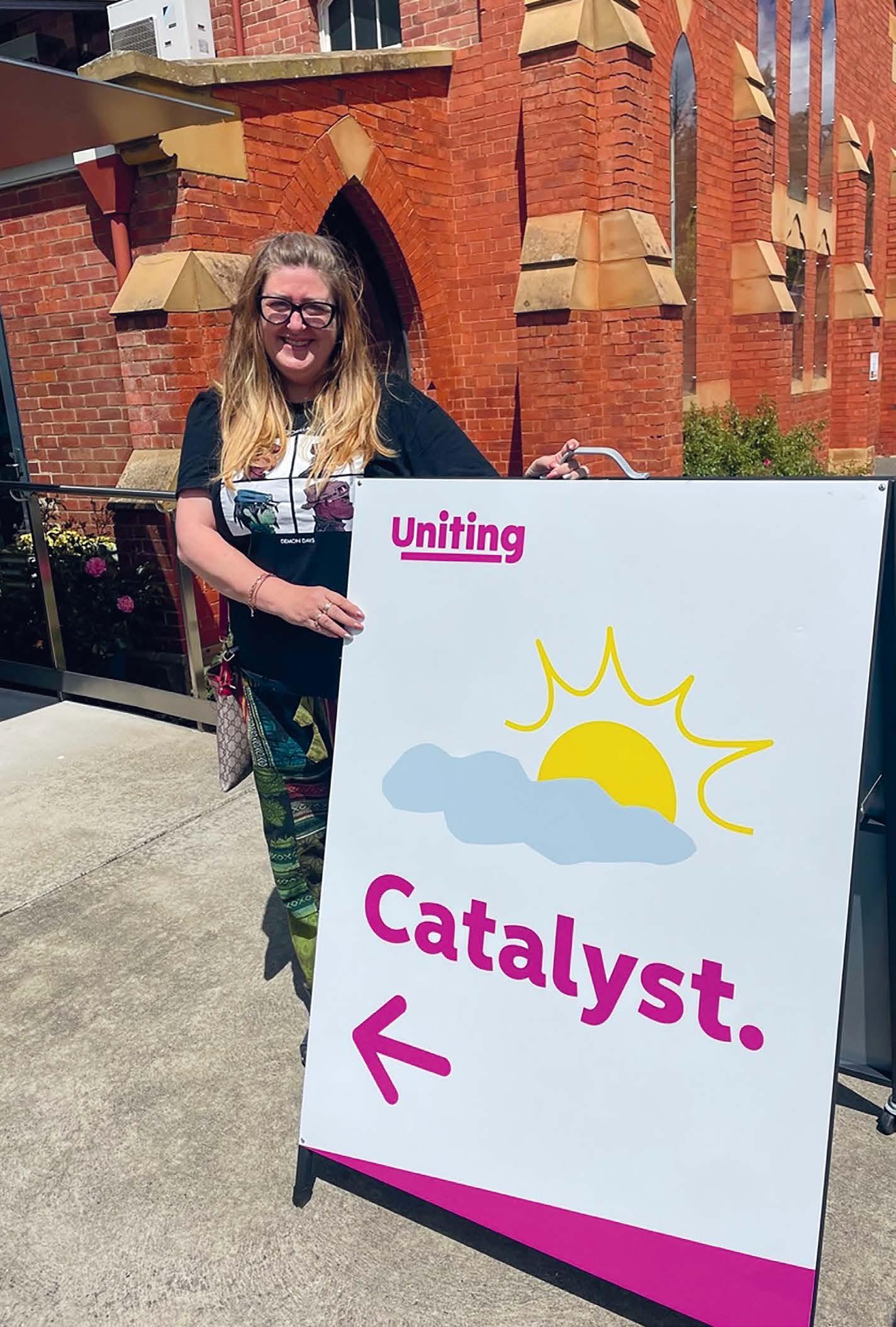
Uniting’s Catalyst program has given Louise long-term hope that she can live a life free of alcohol and drugs.





